Shows

Expedition in die ForschungWie startete das Leben? – mit Bill Martin
Prof. William „Bill“ Martin, Foto: Heinrich-Heine-Universität Düsseldorf
Prof. Bill Martin erforscht an der Universität Düsseldorf den Ursprung des Lebens. Für Biologen ist das Leben eine einzige, große chemische Reaktion. Und die muss irgendwann, irgendwo, irgendwie gestartet sein – und zwar bevor es Leben gab. Nun sucht Prof. Martin gemeinsam mit seinem Team und Kooperationspartner*Innen nach den Umweltbedingungen, in denen das passiert sein könnte.
Bill Martin, ursprünglich aus Texas in den USA, erzählte uns auf Englisch, wie er auf diesen Forschungspfad gekommen ist, und was er und die anderen beteiligten For...
2022-04-3047 min
Expedition in die ForschungKorallenbleiche: Halten die Korallenriffe durch? – mit Anna Koester
Dr. Anna Koester, Seychelle Islands Foundation, (Foto: privat)
Menschliche Aktivitäten bedrohen die Korallenriffe. Dabei erweisen sie uns große Dienste. Sie brechen Sturmwellen vor bewohnten Küsten, ernähren Fische, die wir essen und sind begehrte Tourismusziele. Immer wieder hören wir aber von der sogenannten „Korallenbleiche“, einem katastrophalen Ereignis, bei dem die Korallen ihre Farbe verlieren. Dr. Anna Koester beschäftigt sich mit der Erholung der Korallen nach einer Bleiche.
Ich selbst hatte von den Medienberichten her den Eindruck, gebleichte Korallen sind tote Korallen. Aber Dr. Anna Koester hat mich da eines Besseren belehrt. Sie untersucht...
2022-03-0452 min
Expedition in die ForschungPass auf was Du anfasst! Der Genetische Fingerabdruck – mit Helge Norf
In jeder modernen Krimiserie werden Beteiligte einer Straftat mittels ihrer DNA-Spuren identifiziert. Wir haben Barts alten Studienfreund Dr. Helge Norf gefragt, wie so ein Fall aus Sicht der molekularbiologischen Forensik in der Realität aussieht und wie der genetische Fingerabdruck überhaupt ermittelt wird.
Dr. Helge Norf, LKA Sachsen-Anhalt (privat)
Dr. Norf hat es, nach einer abwechslungsreichen Laufbahn zwischen Ökologie und Molekularbiologie in der akademischen Forschung, nämlich zum Landeskriminalamt von Sachsen-Anhalt verschlagen. Er ist dort Sachverständiger für molekularbiologische Forensik. Wir geben Dir Einblicke in sein Leben, Denken und Vorgehen.
Dabei sprechen wir Themen an, di...
2022-01-2847 min
Expedition in die ForschungDas Geheimnis des großen Gehirns – mit Wieland Huttner
Eines der faszinierendsten Geheimnisse der Evolution ist sicher, wie wir selbst enstanden sind. Deshalb ist mir bei der Suche nach möglichen Themen für Expedition in die Forschung die Pressemitteilung des Max-Planck-Instituts für molekulare Zellbiologie und Genetik sofort ins Auge gesprungen.
Prof. Dr. Wieland B. Huttner / MPI-CBG
Zu meiner großen Freude bot sich Prof. Dr. Wieland Huttner selbst an, sich mit mir zu unterhalten. Er war einer der Gründungsdirektoren des Instituts und ist inzwischen emeritiert. Wir sprachen über seinen bewegten Werdegang, wie er nach Jahrzehnten endlich zur Neurobiologie gefunden hat und natürlich über die...
2021-11-0634 min
Expedition in die ForschungWie man mit Licht hören kann. – Mit Daniel Keppeler
Eine spezielle Neuroprothese kann vielen Hörgeschädigten helfen: das Cochlea-Implantat. Dr. Daniel Keppeler und seine Partner möchten das Implantat nun verbessern. Dazu muss jedoch ein neuer Weg beschritten werden: eine Gentherapie, die Licht hörbar macht.
Dr. Daniel Keppeler
Wir erklären, wie das neue System funktioniert und besprechen, welche Hürden die Forschenden bereits überwunden haben, welche Anstrengungen noch vor ihnen liegen, und bis wann die neue Technik den Gehörlosen zur Verfügung könnte.
Transkript zum Mitlesen
Folge auf YouTube
Unterstütze uns:
IBAN: DE82 1001 0010 0206 8851 38 (Dennis Eckmeier, Postbank)
PayPa...
2021-10-0838 min
Expedition in die ForschungDas Menschengemachte Massensterben – mit Thomas Neubauer
Wie schnell rotten wir Tierarten aus? Diese Frage haben sich Thomas Neubauer und seine Kooperationspartner gestellt. Die Ergebnisse reihen sich in eine lange Liste wissenschaftlicher Veröffentlichungen ein, die uns vor dem rapiden Verlust der Artenvielfalt – der „Biodiversität“ warnen. Die Biodiversitätskrise – das sechste Massensterben – ist in vollem Gange.
Paläobiologe Dr. Thomas A. Neubauer Justus Liebig Universität, Gießen
Die Arbeit konzentriert sich auf das Artensterben in zentral wichtigen Ökosystemen: die Süßgewässer in Europa. Sie vergleicht die Aussterberaten des letzten großen Massensterbens vor 66 Millionen Jahren mit dem heutigen, menschengemachten Artensterben.
Ko-Moderatoren...
2021-09-1747 min
Expedition in die ForschungWas bedeutet Plastik im Meer für die Tiere? Was bedeutet Plastik im Meer für die Tiere? Foto: Thea Hamm auf einer Expedition (Quelle: privat) 180 Millionen Tonnen Plastik schwimmen etwa in den Weltmeeren. Meeresbiologin Thea Hamm erforscht am GEOMAR was diese Umweltverschmutzung mit den Tieren macht. In den Kurzmeldungen geht es um den Lebensraum von Menschenaffen in Westafrika, den Magnetsinn von Vögeln und eine energieschonende Methode, sauberes Trinkwasser aus der Luft zu gewinnen. Co-Hosts: Dennis Eckmeier und Bart Geurten ...
2021-08-0644 min
Expedition in die ForschungWas macht Mikroplastik mit den Tieren im Meer? – mit Thea Hamm
Foto: Thea Hamm auf einer Expedition (Quelle: privat)
180 Millionen Tonnen Plastik schwimmen etwa in den Weltmeeren. Meeresbiologin Thea Hamm erforscht am GEOMAR was diese Umweltverschmutzung mit den Tieren macht. In den Kurzmeldungen geht es um den Lebensraum von Menschenaffen in Westafrika, den Magnetsinn von Vögeln und eine energieschonende Methode, sauberes Trinkwasser aus der Luft zu gewinnen.
Co-Hosts: Dennis Eckmeier und Bart Geurten
Transkript zum Mitlesen
Anhören auf YouTube
Unterstütze unsere Arbeit mit einem Trinkgeld:IBAN: DE82 1001 0010 0206 8851 38 (Dennis Eckmeier, Postbank) oder PayPal
Kapitel
00:00 Intro01:58 Meldungen aus...
2021-08-0644 min
Expedition in die ForschungWas bedeutet Plastik im Meer für die Tiere? 180 Millionen Tonnen Plastik schwimmen etwa in den Weltmeeren. Meeresbiologin Thea Hamm erforscht am GEOMAR was diese Umweltverschmutzung mit den Tieren macht. In den Kurzmeldungen geht es um den Lebensraum von Menschenaffen in Westafrika, den Magnetsinn von Vögeln und eine energieschonende Methode, sauberes Trinkwasser aus der Luft zu gewinnen. Foto: Thea Hamm auf einer Expedition (Quelle: privat) Co-Hosts: Dennis Eckmeier und Bart Geurten Transkript zum Mitlesen Folge auf Y...
2021-07-3044 min
Expedition in die ForschungImplantate aus Nanopartikeln – Gesundheits-Tracker der Zukunft? – mit Carsten Sönnichsen
Ständige Blutentnahmen machen chronisch Erkrankten oft das Leben zusätzlich schwer. Viele Diabetes-Erkrankte, zum Beispiel, müssen sich teils über Jahrzehnte täglich für die Blutzuckermessung stechen.
Nanobiotechnologe Carsten Sönnichsen hat eine faszinierende Idee, wie man den Menschen diese kleine Tortur ersparen könnte. Er hat mir erzählt, wie man aus Goldnanopartikel Bio-Sensoren macht, die man unter die Haut implantiert und von außen auslesen kann. Außerdem erfahren wir, wie er gemeinsam mit seiner Arbeitsgruppe an der Uni Mainz die ersten erfolgreichen Tests durchgeführt hat.
Prof. Carsten Sönnichsen, Uni MainzBilq...
2021-07-091h 02
Expedition in die ForschungGrüner Wasserstoff, Mikroplastik und medizinische Nanopartikel
Bekommen wir billigen Wasserstoff? Was macht Mikroplastik mit Miesmuscheln? Und kann man irgendetwas gegen ständige Blutabnahmen beim Arzt machen? Wir haben wieder drei Pressemitteilungen aus der Forschung herausgesucht.
Transkript zum Mitlesen
Die Folge auf YouTube
Unterstütze unsere Arbeit mit einem Trinkgeld:IBAN: DE82 1001 0010 0206 8851 38 (Dennis Eckmeier, Postbank) oder PayPal
Gefällt Dir ein Beitrag? Dann teile den entsprechenden Post auf Social Media!
1. Weniger Hoffnung auf billigen Wasserstoff? Instagram – Twitter – Facebook – YouTube (Shorts)2. Miesmuscheln in Mikroplastik Instagram – Twitter – Facebook – YouTube (Shorts)3. Gesundheitsmonitor als Tätowierung Instagram – Twitter – Facebook – YouTube (Shorts)
QUELLEN
2021-05-0615 min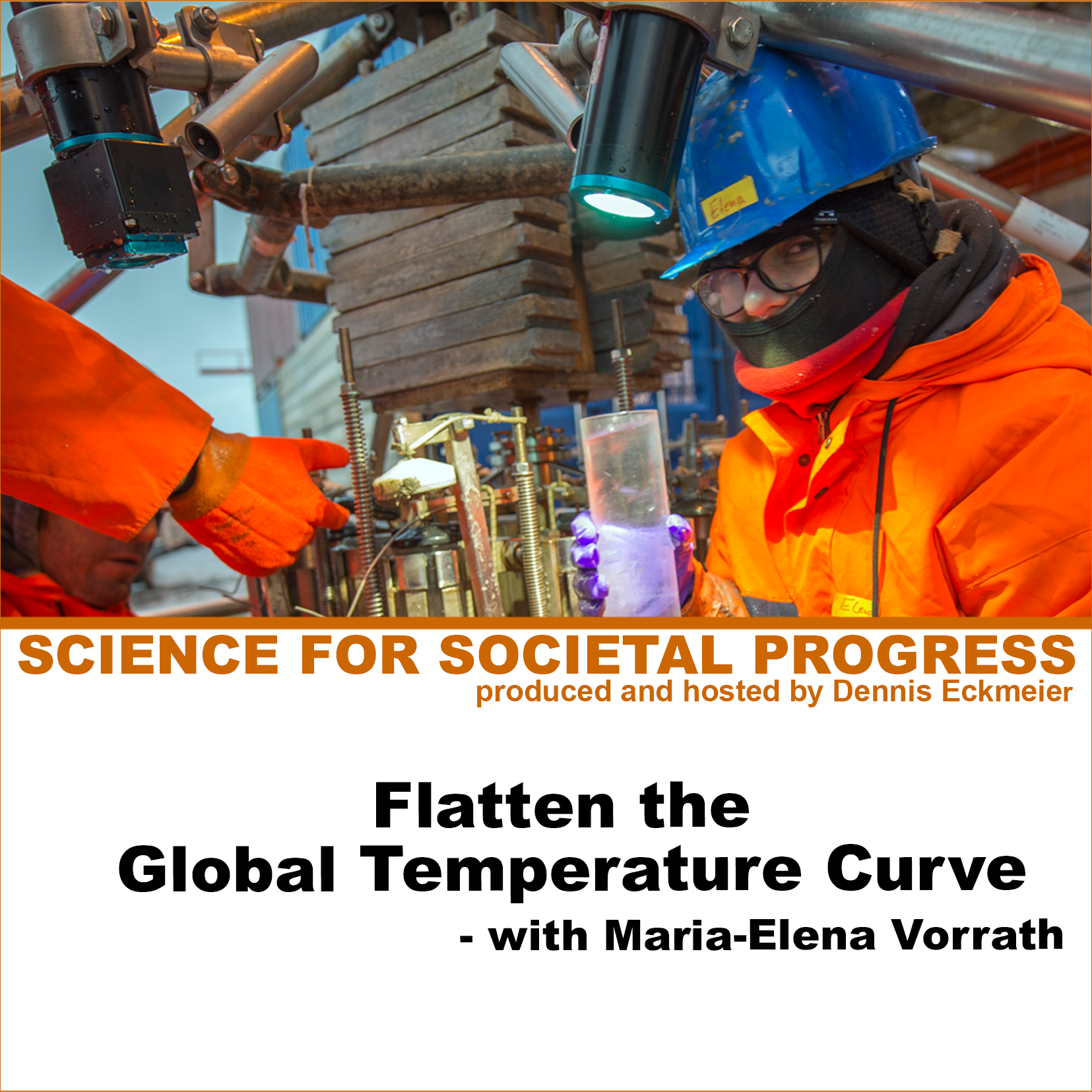
Science for Progress54 Flatten the Global Temperature Curve – with Maria-Elena VorrathMy guest in this episode is Dr. Maria-Elena Vorrath, a geologist who studies the history of climate change, who just finished her PhD. Besides her work as a researcher she is a science communicator with Scientists for Future.
Her message is clear: we can't stop climate change, but we can slow the temperature rise. Every bit of reduction in carbon dioxide emissions saves lives down the line. And: A low-carbon society cannot rely on low-emission-technologies, only, but it also has to reduce it's overall consumption.
We further talk about Elena's background and research, as well as her science communication for...
2020-09-1400 min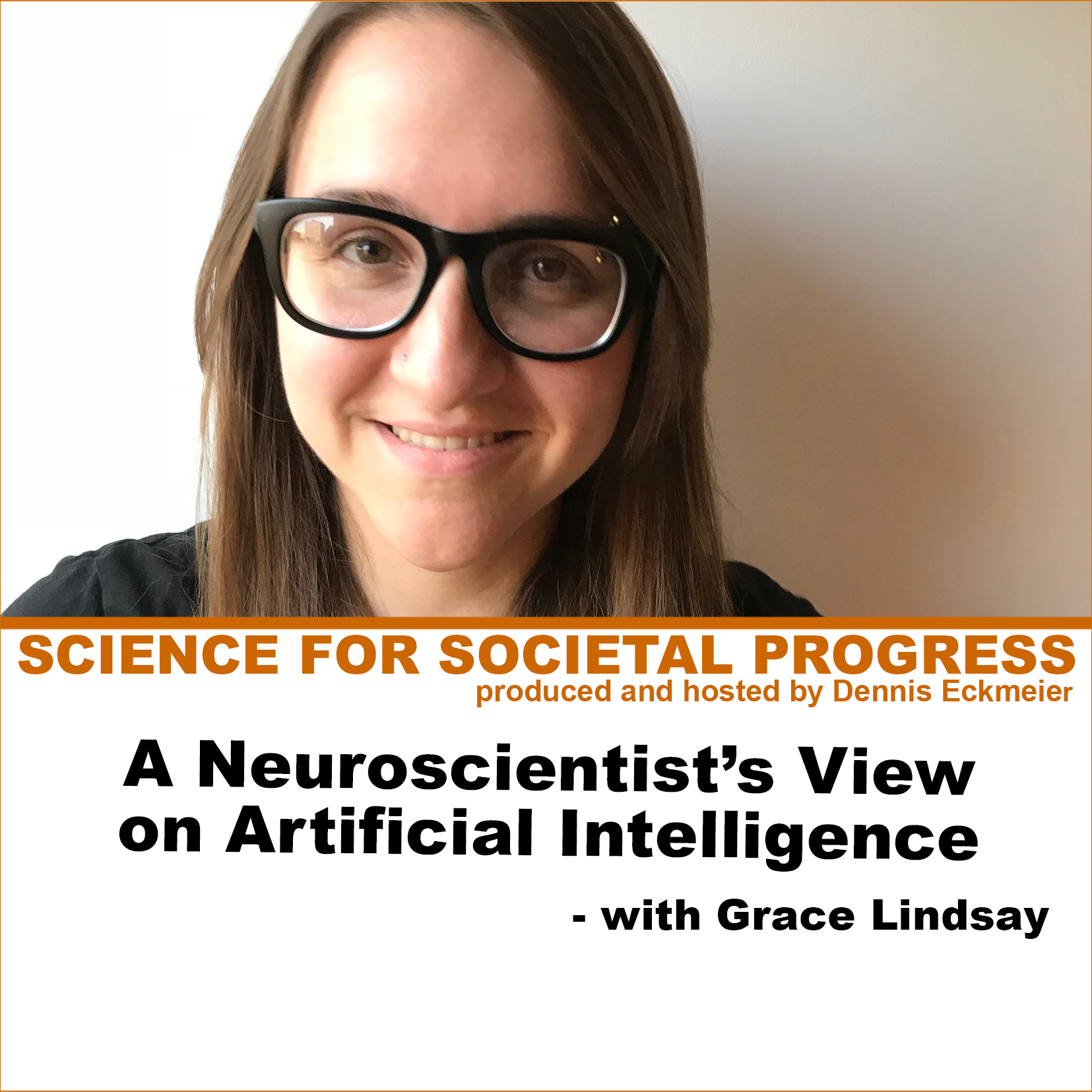
Science for Progress53 A Neuroscientist’s View on Artificial IntelligenceOne of my favorite topics is artificial intelligence, or - more specifically - what we can learn from neuroscience about artificial intelligence. So, when I was gifted the book "Life 3.0: Being Human in the Age of Artificial Intelligence" by Max Tegmark I enjoyed the read thoroughly. But, several scenarios envisioned in the book as paths to human-like artificial intelligence didn't make sense to me, as a neuroscientist. So a bestseller book on artificial intelligence completely ignored the views of neuroscience.
This is why invited Dr. Grace Lindsay, host of the podcast "Unsupervised Thinking" about computational neuroscience and artificial intelligence. Grace...
2020-08-2000 min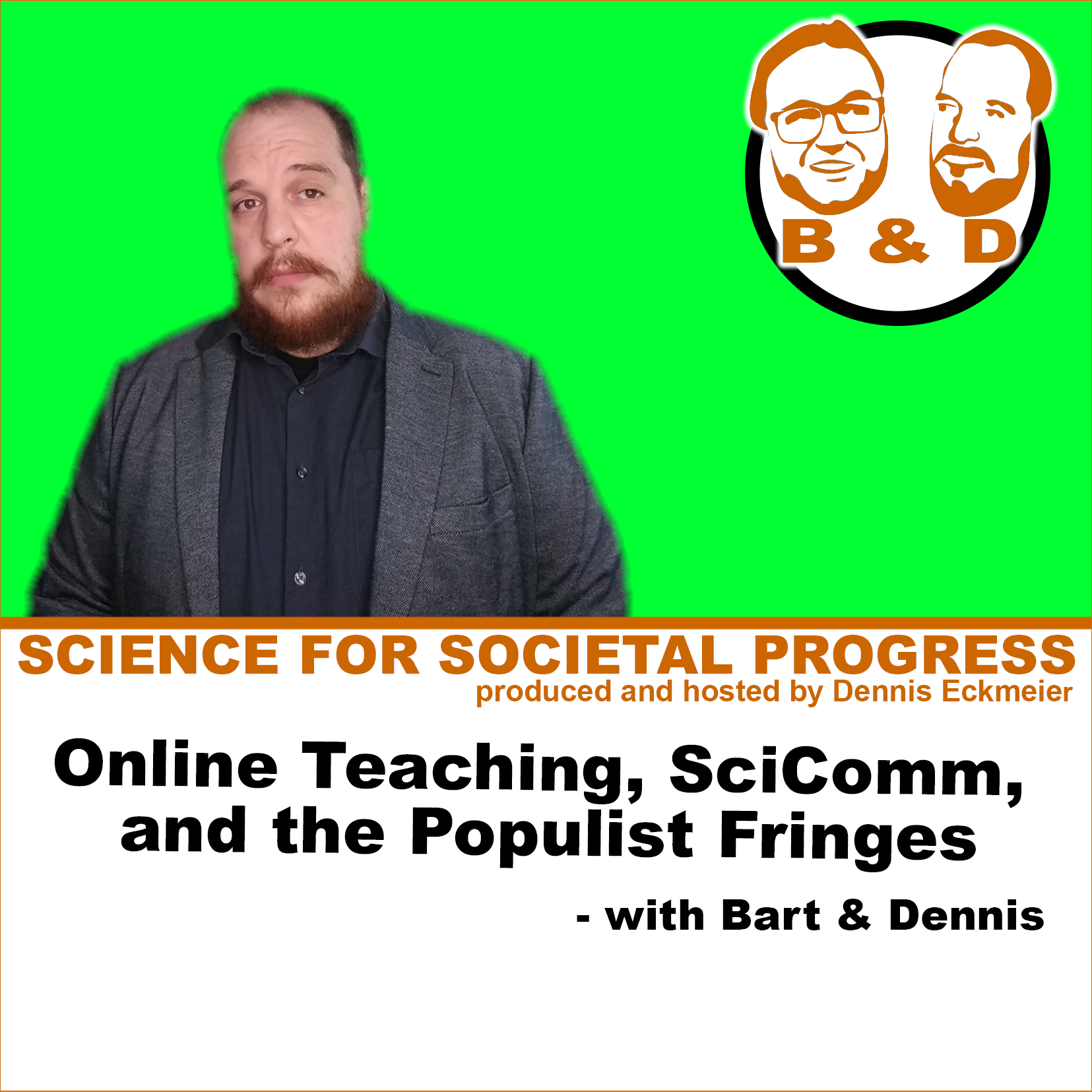
Science for Progress52 B&D Online Teaching, SciComm, and the Populist FringesMy co-host Bart Geurten and I had a rather spontaneous conversation, again. We talk about remote teaching, how science communication and science journalism could be supported by the public, and speculate about how the political fringe might be missing a sense of belonging.
Following a catch-up about our lives in the pandemic, we talk about taking lectures online. Should we do it? Are there circumstances when it makes sense? Or does it remove important social interactions among students?
We then talk about science communication. There was a hearing in the German Bundestag about how the parliament could install a funding...
2020-08-0300 min
Science for Progress52 B&D Online Teaching, SciComm, and the Populist Fringes
My co-host Bart Geurten and I had a rather spontaneous conversation, again. We talk about remote teaching, how science communication and science journalism could be supported by the public, and speculate about how the political fringe might be missing a sense of belonging.
Following a catch-up about our lives in the pandemic, we talk about taking lectures online. Should we do it? Are there circumstances when it makes sense? Or does it remove important social interactions among students?
We then talk...
2020-08-0338 min
Science for Progress51 Extended Throwback: Precarious Postdocs – with Gary McDowellPostdocs are, besides graduate students, the main workforce in academic research. Following the PhD, the postdoc position is the only way to follow a research career within academia. Many PhDs around the world are advised to go to the USA for a postdoc - or two - because it is known for its large research output and high-quality research institutes. Around two-thirds of postdocs in the USA are foreign-born.
In this episode, I talk to Gary McDowell, a UK born scientist in protein research who, over the last few years, worked with “Future of Research” to investigate the conditions postdocs in t...
2020-06-2900 min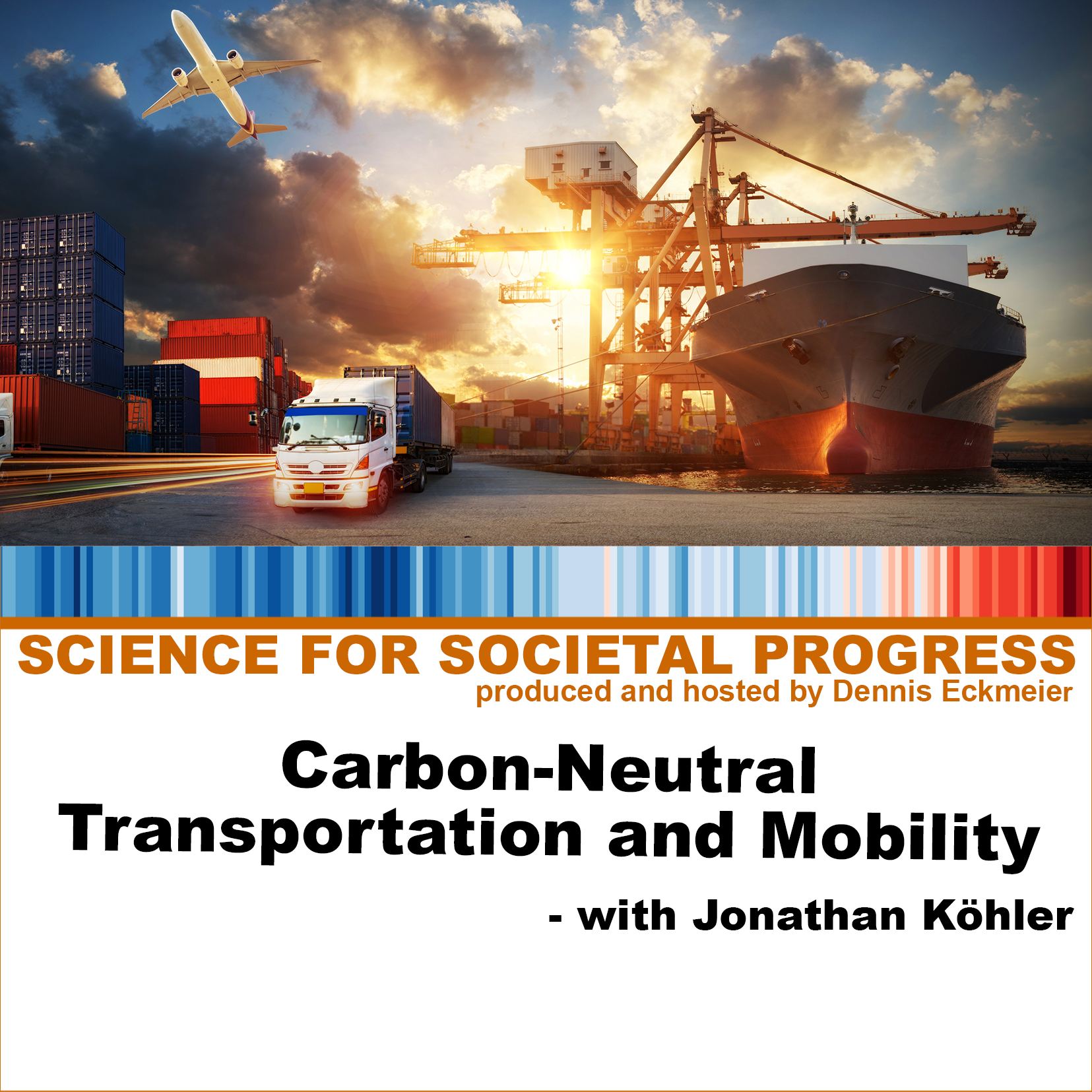
Science for Progress50 Sustainable Mobility – with Jonathan Koehler of Scientists for FutureFor this episode, I spoke with Dr. Jonathan Köhler who studies the transformation of the transportation and mobility sectors using computational models at Competence Centre Sustainability and Infrastructure Systems of Fraunhofer Institute.
He discusses how ships and aircraft can become carbon neutral, and answers some common questions on the topic. He then talks about his experience with Scientists for Future and Fridays for Future. In the end, he gives us a vision of how mobility could look like in a climate-neutral city.
Listen to the Full Conversation on Patreon!
Resources:
Fraunhofer Institute for Systems and Innovation Research ISIDr. Köhle...
2020-06-2000 min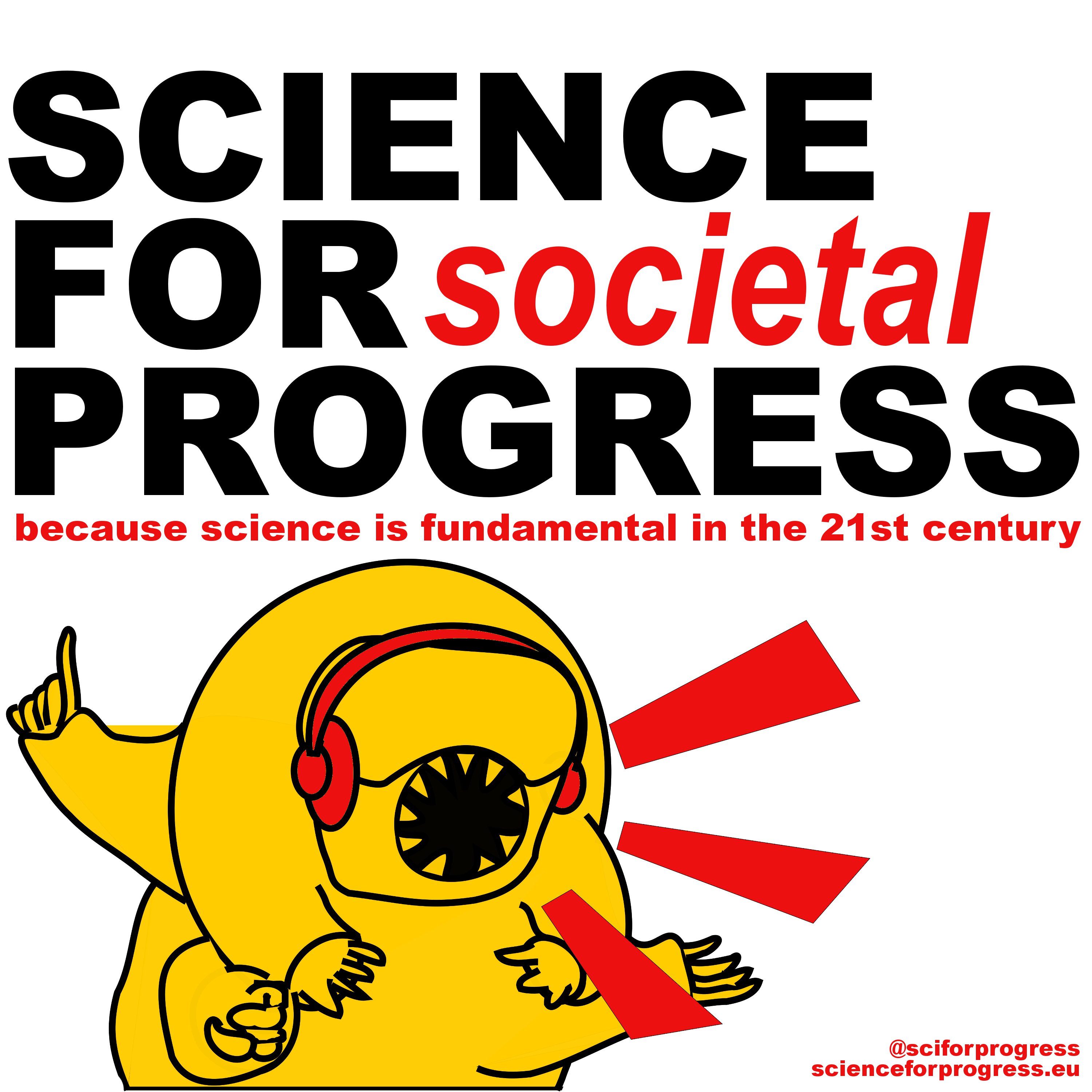
Science for Progress49 Times of Crisis – Conspiracy Myths and SciComm – with B&DFor this episode, Bart and I had a rather spontaneous chat about conspiracy beliefs and science communication during the COVID-19 pandemic.
Worldwide conspiracy myths about SARS-CoV-2 appear to be on the rise, and conspiracy narrators team up with other cranks in demonstrations - 'hygiene demos' they call it in Germany. And the far right is taking advantage of them.
Listen to the Full Conversation on Patreon!
At the same time, science communication is at the center of the social discussions surrounding COVID-19. Several virologists have reached a certain celebrity status, which is having a lot of ... interesting ... effects. At the...
2020-06-0100 min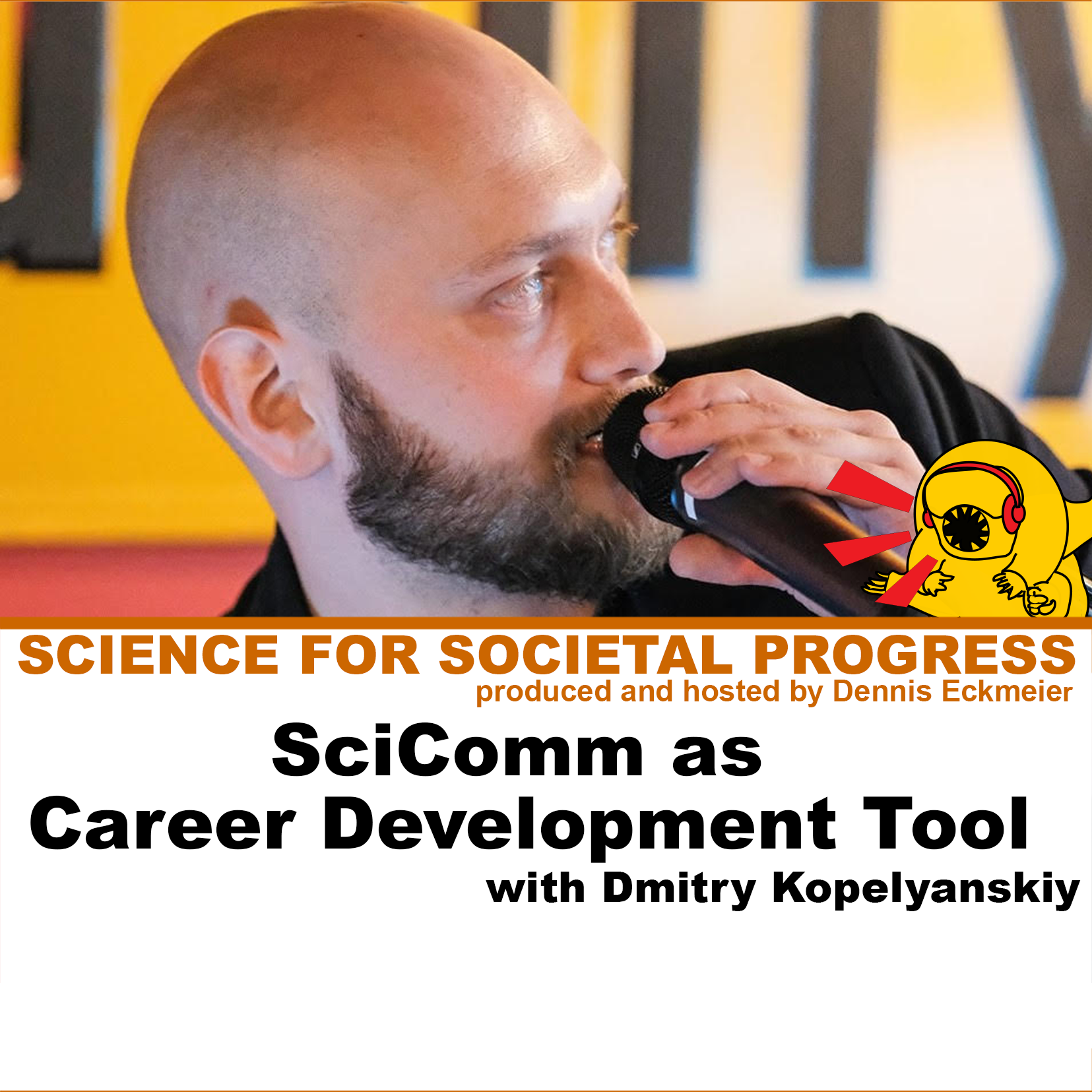
Science for Progress48 SciComm as Career Development Tool – Dmitry KopelyanskiyFor this episode, Dennis talked to Dmitry Kopelyanskiy, a contest-winning science communicator who gives entertaining science talks on stage – mostly about his own research on tropical diseases. But here, Dmitry also talks about his academic career odyssey (from Russia to Switzerland via Israel and Germany), his path to science communication, and his involvement in […]
The post 48 SciComm as Career Development Tool – Dmitry Kopelyanskiy appeared first on Science for Progress.
2020-05-2231 min
Science for Progress48 SciComm as Career Development Tool – Dmitry Kopelyanskiy
For this episode, Dennis talked to Dmitry Kopelyanskiy, a contest-winning science communicator who gives entertaining science talks on stage – mostly about his own research on tropical diseases. But here, Dmitry also talks about his academic career odyssey (from Russia to Switzerland via Israel and Germany), his path to science communication, and his involvement in “Skills for Scientists” – a career development program at the University of Lausanne.
Over the past two years, Dmitry Kopelyanskiy has been quite successful at science communication contests. At FameLab he made it all the way to the internat...
2020-05-2231 min
Science for Progress48 SciComm as Career Development Tool – Dmitry KopelyanskiyFor this episode, Dennis talked to Dmitry Kopelyanskiy, a contest-winning science communicator who gives entertaining science talks on stage – mostly about his own research on tropical diseases. But here, Dmitry also talks about his academic career odyssey (from Russia to Switzerland via Israel and Germany), his path to science communication, and his involvement in “Skills for Scientists” – a career development program at the University of Lausanne.
Over the past two years, Dmitry Kopelyanskiy has been quite successful at science communication contests. At FameLab he made it all the way to the international finals in the UK! But he also did rather w...
2020-05-2200 min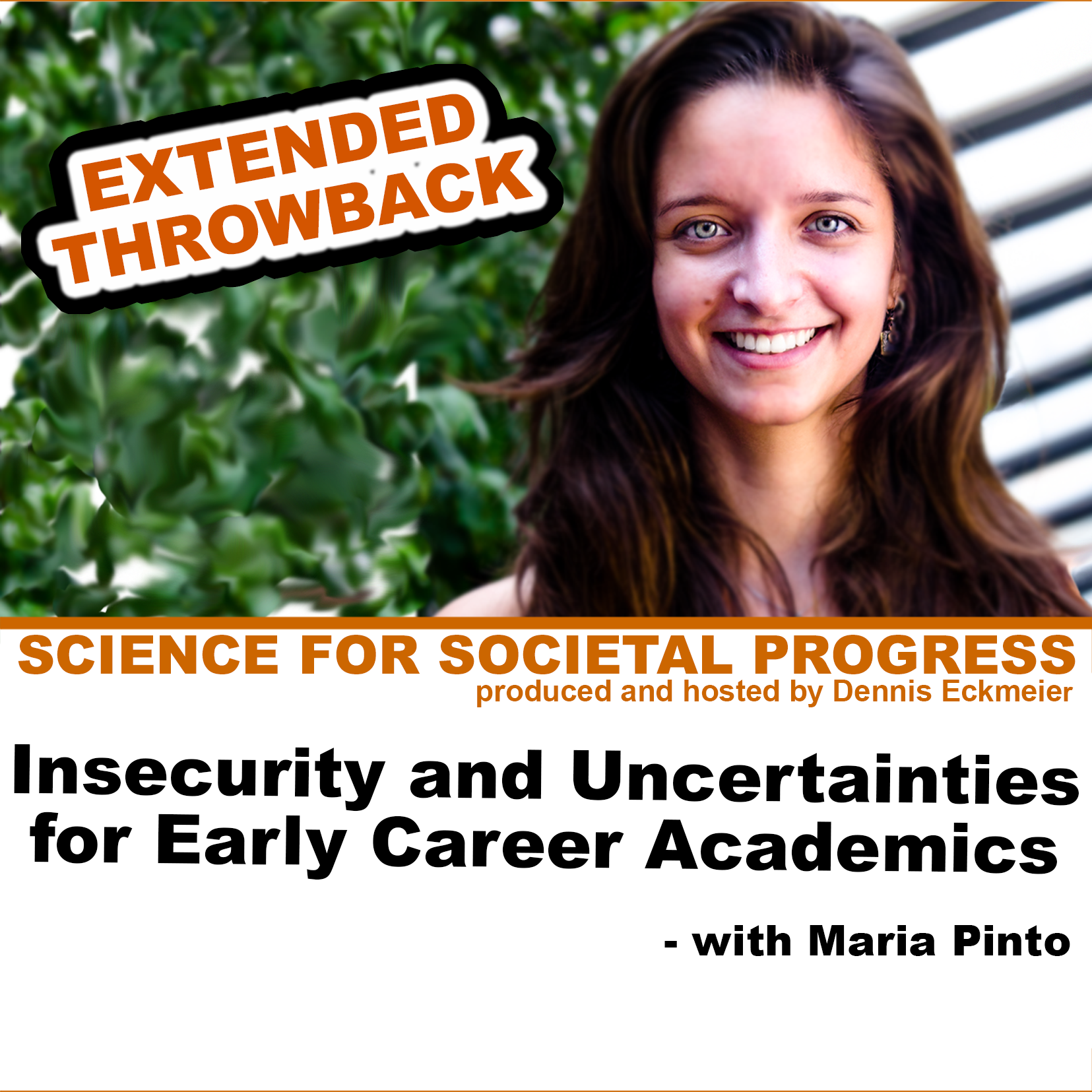
Science for Progress47 Extended Throwback: Insecurity and Uncertainties for Early Career Academics – with Maria PintoDuring this season, once every 4 weeks, I pick one of the 13 most popular episodes from the first two years and post the original interview. These extended editions contain a couple of parts that didn’t make it into the final cut and give an insight into the underlying conversation.
Supporters on Patreon have immediate access to these versions, btw. If you are one of them, thank you very much! If not, think about it!
Find the final edition here!
Academics are Spoiled. Right?
The stereotype of academics is that they live a well-protected life in the ivory tower. But this is...
2020-05-1500 min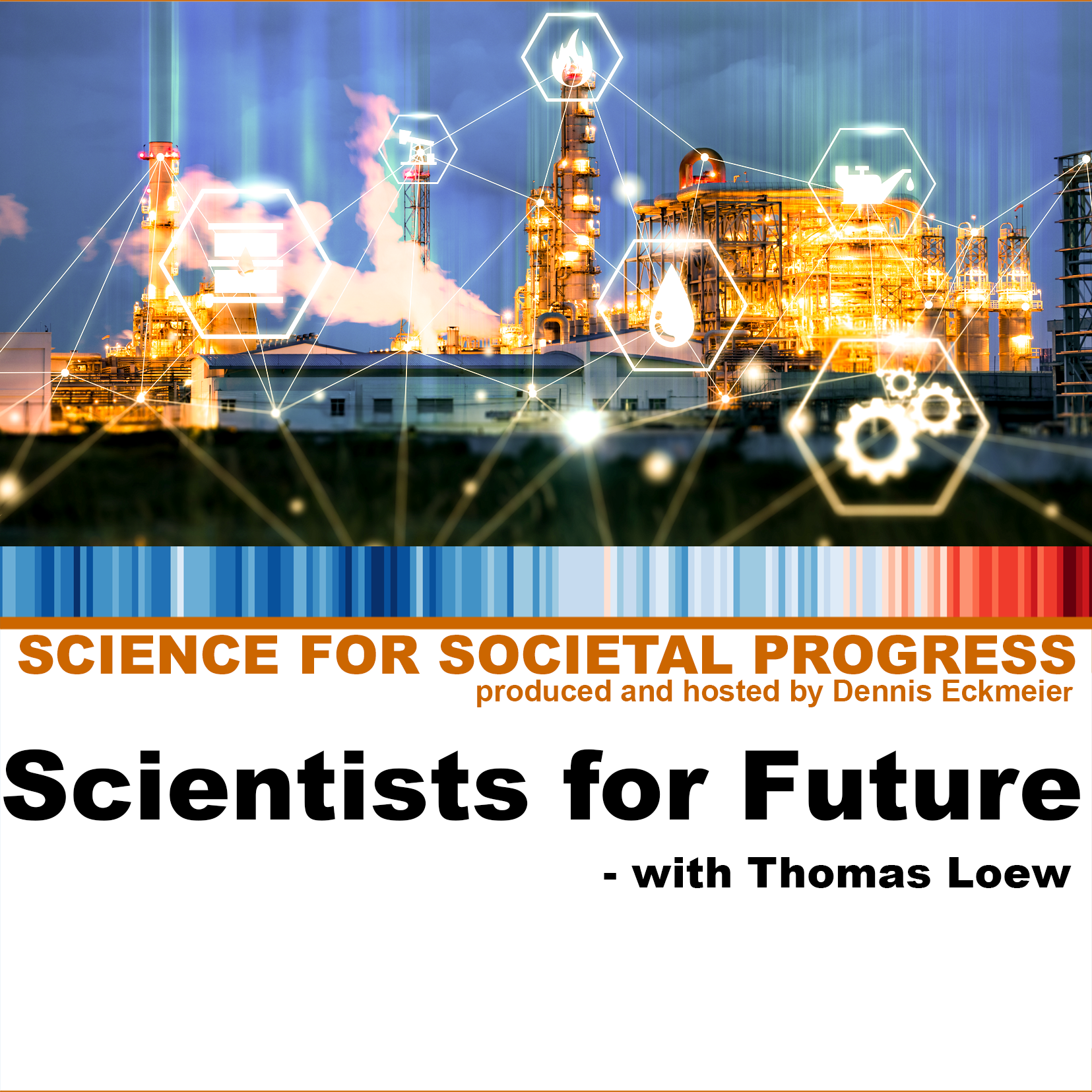
Science for Progress46 Scientists for Future – with Thomas LoewThe initial statement of Scientists for Future in support of Fridays for Future came out just at the right time. In the public debate, it was a swift response to politicians who were trying to mute the student strikes by telling them to "leave it to the experts".
In reality, scientists who had been concerned about the climate and the ecological damages human activities for decades had been working on the statement for a while. Among the authors was our guest Thomas Loew.
Listen to the Full Conversation on Patreon!
Thomas Loew is a German researcher who started his own...
2020-05-0900 min
Science for Progress45 Animal Research During the COVID-19 Lockdown – with B&D and Daniela BuchwaldIn this episode, Bart and I invited PhD candidate Daniela Buchwald from the German Primate Center – a private research institute. We compare how the University of Göttingen and the German Primate Center (GPC) responded to the impending shutdown of most research activities - with a focus on how the animals are being cared for.
The conversation was recorded on Tuesday, March 17, just after the German local government began to take serious action to reduce public life to slow the spread of SARS-CoV-2, the virus that causes COVID-19. Remember that when we talk about news reaching us on Monday, we mea...
2020-03-2400 min
Science for Progress44 Green Biotechnology – with David Spencer
Dennis’s guest for this episode is David Spencer, a researcher
in plant physiology and phytopathology in Germany. In his Ph.D., David uses
genetic engineering to fortify soybeans against fungal infection. They explain why
we need more resilient crops fast, why this would be great for the environment,
and how genetic engineering can help achieve this.
The episode complements the previous one (extended
throwback with Hélène Pidon) which focused on explaining different breeding
methods and how artificially induced mutations compare to naturally occu...
2020-03-1636 min
Science for Progress44 Green Biotechnology – with David SpencerDennis’s guest for this episode is David Spencer, a researcher
in plant physiology and phytopathology in Germany. In his Ph.D., David uses
genetic engineering to fortify soybeans against fungal infection. They explain why
we need more resilient crops fast, why this would be great for the environment,
and how genetic engineering can help achieve this.
The episode complements the previous one (extended
throwback with Hélène Pidon) which focused on explaining different breeding
methods and how artificially induced mutations compare to naturally occurring
ones.
Listen to the Full Conversation on Patreon!
How can biotechnology make agriculture more envi...
2020-03-1600 min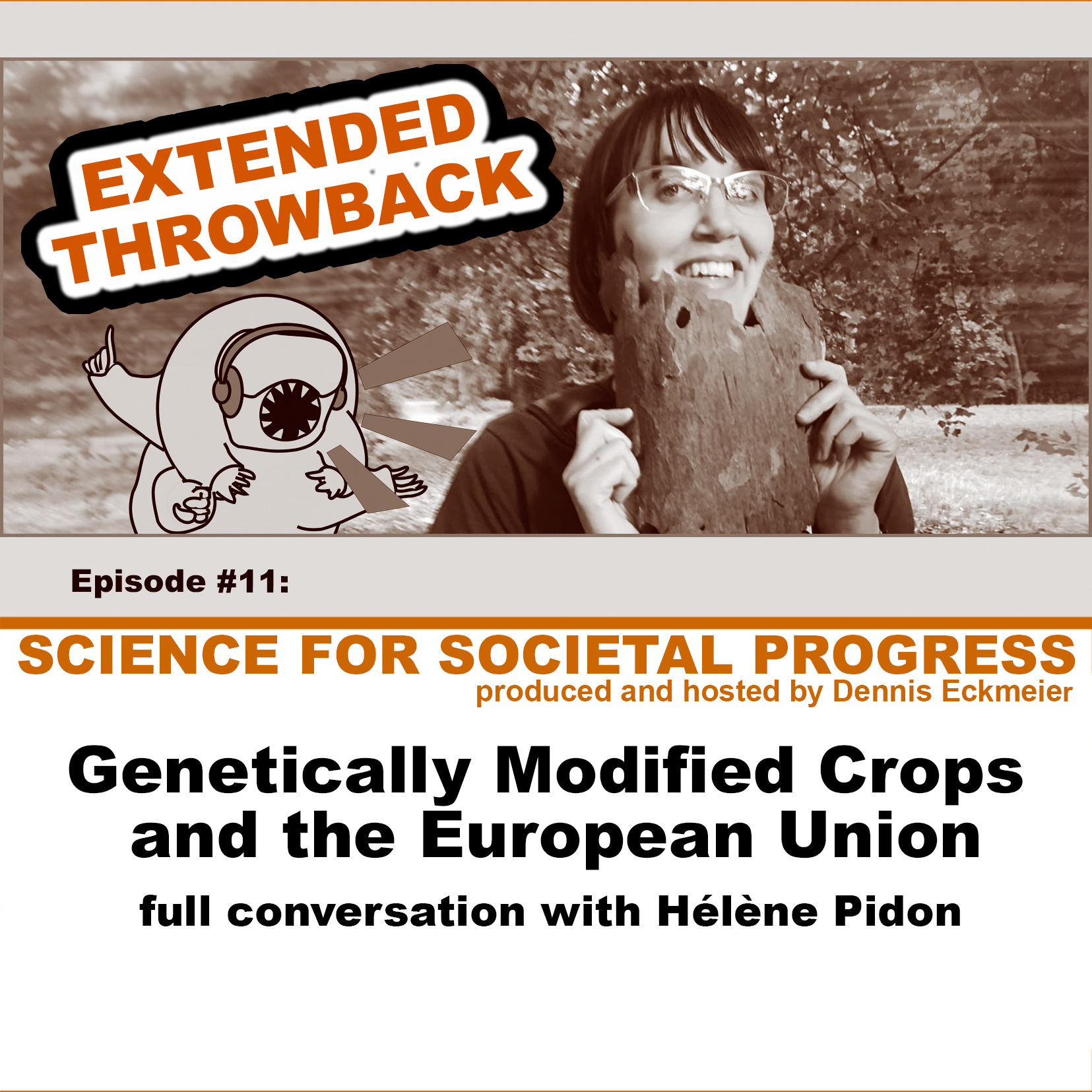
Science for Progress43 Extended Throwback: Genetically Modified Crops and the European Union – with Hélène PidonDuring this season, once every 4 weeks, I pick one of the 13 most popular episodes from the first two years and post the original interview. These extended editions contain a couple of parts that didn’t make it into the final cut and give an insight into the underlying conversation.Supporters on Patreon have immediate access to these versions, btw. If you are one of them, thank you very much! If not, think about it!
This time I present to you the full conversation to 11: Genetically Modified Crops and the European Union – with Hélène Pidon
Plant geneticists are not happy...
2020-03-1000 min
Science for Progress42 Entering Year Three, Dawkins and Eugenics & Ranking Unis – with Bart and Dennis
This
episode marks the official end of the second year of this podcast! (unfortunately,
there was still no present for Bart - consider becoming a Patron to help!) Apart
from the plans for year 3, Bart & Dennis discussed the hot topic of the
week: a provocative tweet by Richard Dawkins on Eugenics, and the dos and don’ts,
and pros and cons of university rankings.
Listen to the Full Conversation on Patreon!
AN AMBIGUOUS(?) TWEET
2020-03-0140 min
Science for ProgressEntering Year Three, Dawkins and Eugenics & Ranking Unis - with Bart and DennisThis
episode marks the official end of the second year of this podcast! (unfortunately,
there was still no present for Bart - consider becoming a Patron to help!) Apart
from the plans for year 3, Bart & Dennis discussed the hot topic of the
week: a provocative tweet by Richard Dawkins on Eugenics, and the dos and don’ts,
and pros and cons of university rankings.
Listen to the Full Conversation on Patreon!
AN AMBIGUOUS(?) TWEET
Richard Dawkins (a famous evolutionary biologist and member of the royal society) tweeted that, while he deplores eugenic practice, ”it” would still “work”, as “it” would work in farm a...
2020-03-0100 min
Science for Societal Progress42 Entering Year Three, Dawkins and Eugenics & Ranking Unis - with Bart and Dennis
2020-03-0140 min
Science for Progress41 @RealScientists Tweet their SciComm – with Upulie Divisekera
For this episode, Dennis talked to Upulie Divisekera, the Australian molecular biologist and accomplished science communicator who co-founded “@RealScientists”. She shares how she got access to platforms with large audiences, and lessons from her SciComm experiences: that you should use storytelling and never underestimate your audience.
If you are on Twitter and like to learn about science and the people behind it, you probably know @Realscientists, the Twitter rotating curation account. There, real-life scientists sign up to talk about science and their daily lives for a week at a time; showcasing the...
2020-02-0931 min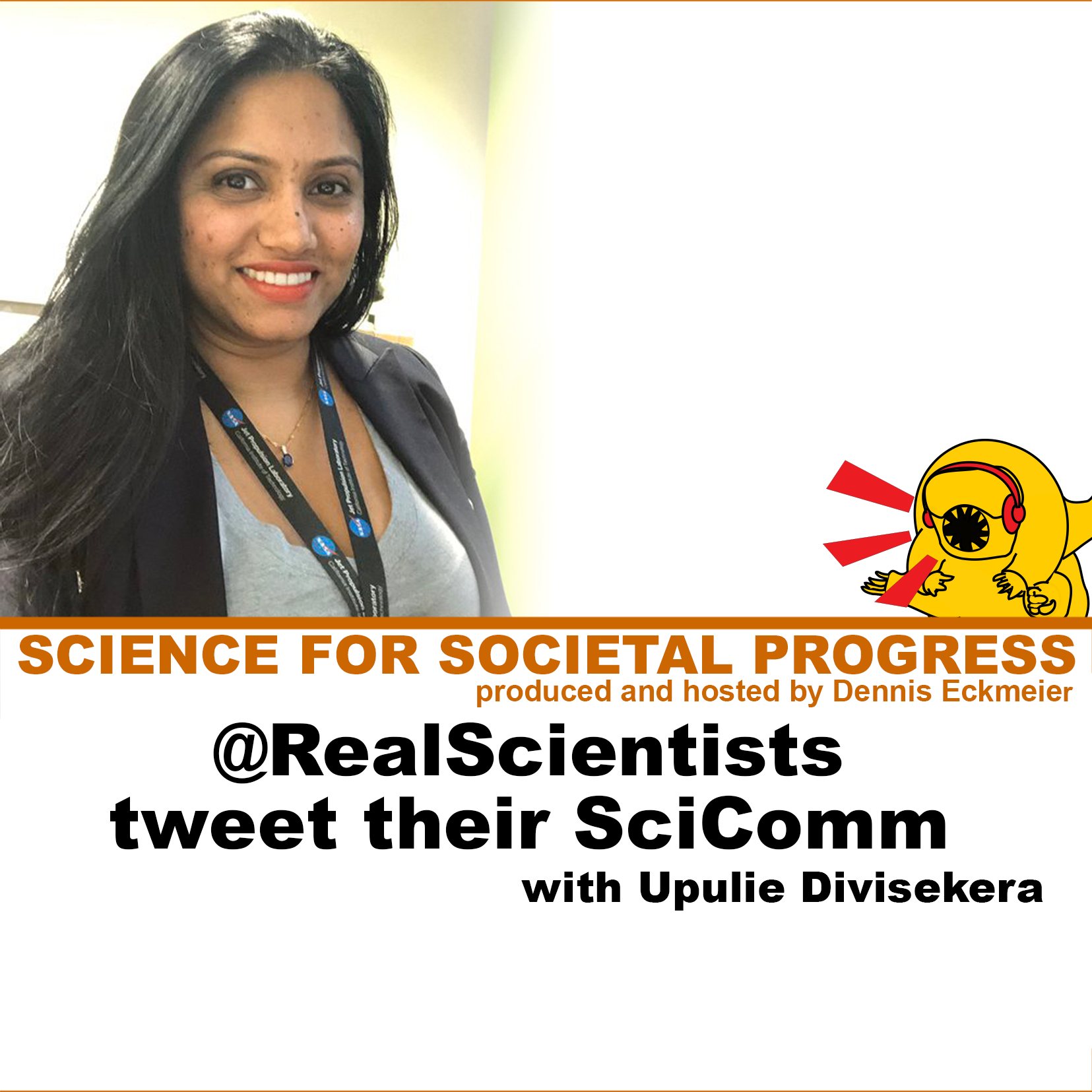
Science for Progress41 @RealScientists Tweet their SciComm – with Upulie DivisekeraFor this episode, Dennis talked to Upulie Divisekera, the Australian molecular biologist and accomplished science communicator who co-founded “@RealScientists”. She shares how she got access to platforms with large audiences, and lessons from her SciComm experiences: that you should use storytelling and never underestimate your audience.
If you are on Twitter and like to learn about science and the people behind it, you probably know @Realscientists, the Twitter rotating curation account. There, real-life scientists sign up to talk about science and their daily lives for a week at a time; showcasing the diversity of scientists, and breaking the trope of acad...
2020-02-0900 min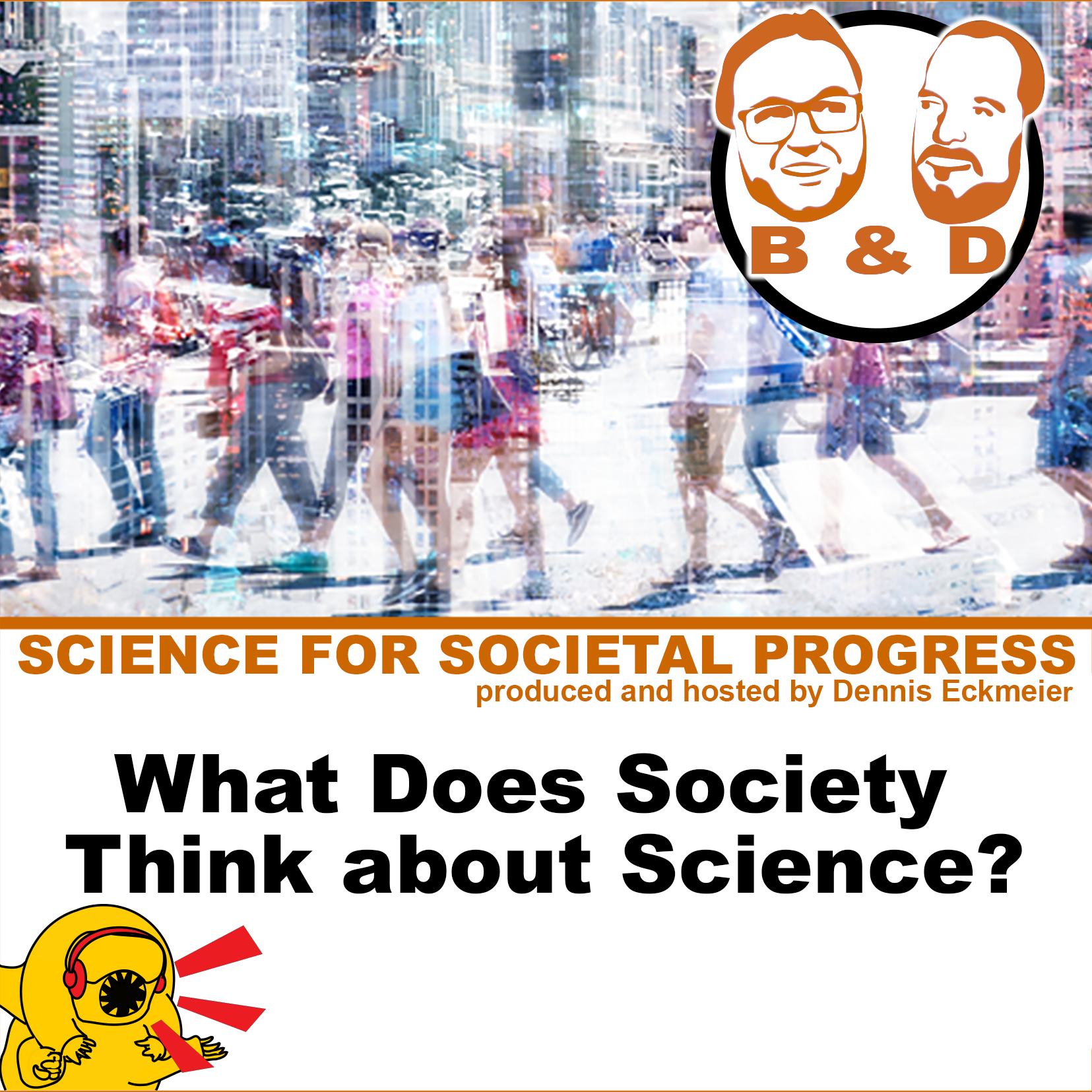
Science for Progress40 What does Society Think about Science? – B&DIn this episode, Bart and I talk about Wissenschaftsbarometer or “science barometer”. This annual survey in Germany and Switzerland is about the public’s trust in science and scientists. Afterward, we talk about a similar survey in the USA, published by the Pew Foundation a few months earlier. For each survey, we picked a couple of questions and interpret the answers.
As a side note: The extended version of this episode has two parts. Each one is more than an hour long. You can access both parts by becoming a supporter on Patreon. In the past, we asked for a minimum...
2020-01-2900 min
Science for Progress39 From Cosy(?) Academia to Harsh(?) Industry! – with John StowersLife as an Early Career Researcher is rather uncertain. The conditions for most postdocs aren’t really great and the availability of professorships isn’t increasing at the same rate as the number of PhDs entering the academic career path - we talk about this, regularly.
So it makes sense to seriously consider other career options, and we do so every now and then, too.
For this episode, I talk to Dr. John Stowers, engineer, neuroscientist, and founder of "LoopBio", about the transition from postdoc to technology business founder!
Listen to the Full Conversation on Patreon!
Academic Nomad
After being hit...
2020-01-0500 min
Science for Progress38 A Split in the Human Species: ANYA the Movie – with Carylanna Taylor and Jacob OkadaIn this episode, I talk about the science fiction movie ANYA with its creators, Anthropologist Dr. Carylanna Taylor, and Jacob Okada of First Encounter Productions (not a sponsor).
The plot of ANYA could happen today! It all starts with a couple in New York that has difficulty having a baby. The groom is a member of the Narval People who keep to themselves - mostly because they think there is a curse that prohibits them from having children with anyone but other members of the community. They bring in a geneticist to find out why they are having problems procreating...
2019-11-2400 min
Science for Progress38 A Split in the Human Species: ANYA the Movie – with Carylanna Taylor and Jacob Okada
In this episode, I talk about the science fiction movie ANYA with its creators, Anthropologist Dr. Carylanna Taylor, and Jacob Okada of First Encounter Productions (not a sponsor).
The plot of ANYA could happen today! It all starts with a couple in New York that has difficulty having a baby. The groom is a member of the Narval People who keep to themselves - mostly because they think there is a curse that prohibits them from having children with anyone but other members of the community. They bring in a geneticist...
2019-11-2437 min
Science for Progress37 NOT IN MY BACKYARD! – with Bart and Dennis
After an unforgivable delay this episode is finally out. We had some personal and technical delays. Sorry about that.
Anyways, in this episode Bart and I continue a conversation about the Energiewende. Based on the latest episode we spoke about which solutions we think should work well. The big problem seem to be the “Not In My BackYard” stance of many people who live where the new infrastructure need to be built.
Since Brexit was supposed to happen, we also talk about Brexit, and how it is hurt...
2019-11-1832 min
Science for Progress37 NOT IN MY BACKYARD! – with Bart and DennisAfter an unforgivable delay this episode is finally out. We had some personal and technical delays. Sorry about that.
Anyways, in this episode Bart and I continue a conversation about the Energiewende. Based on the latest episode we spoke about which solutions we think should work well. The big problem seem to be the “Not In My BackYard” stance of many people who live where the new infrastructure need to be built.
Since Brexit was supposed to happen, we also talk about Brexit, and how it is hurting science in the UK.
Listen to the Full Conversation on Patreon!
Energiewende
To m...
2019-11-1800 min 2019-11-1732 min
2019-11-1732 min
Science for Progress36 Energiewende II: Power DistributionThis summer climate change has finally made it back into public discussion in Germany. In the last episode on climate change, Rüdiger Eichel and I spoke about Fridays for Future and how the results of the election for the European Parliament reflected the increased awareness for environmental topics in the EU.
In this episode I talk to Tom Brown from the Karlsruhe Insttitute of Technology. He models how we can use different energy distribution systems to balance the fluctuating power production from renewable sources. There are many variables and options to consider. But the good news is that a c...
2019-10-2100 min
Science for Progress35 Why Academia Fails – with Bart and Dennis
The main topic for this episode is Why Academia Fails… or better, what we may learn from the book “Why Nations Fail” (Acemoglu & Robinson) about the shortcomings of academia. But before we get to it, we will talk briefly about what happened over the last month - most importantly, I will give you my report on the Global Climate Strike as I experienced it in Lisbon, on September 27th.This episode is special, in the sense that we decided to make it a 2-Part episode. In this first part we basically set up the ba...
2019-10-0626 min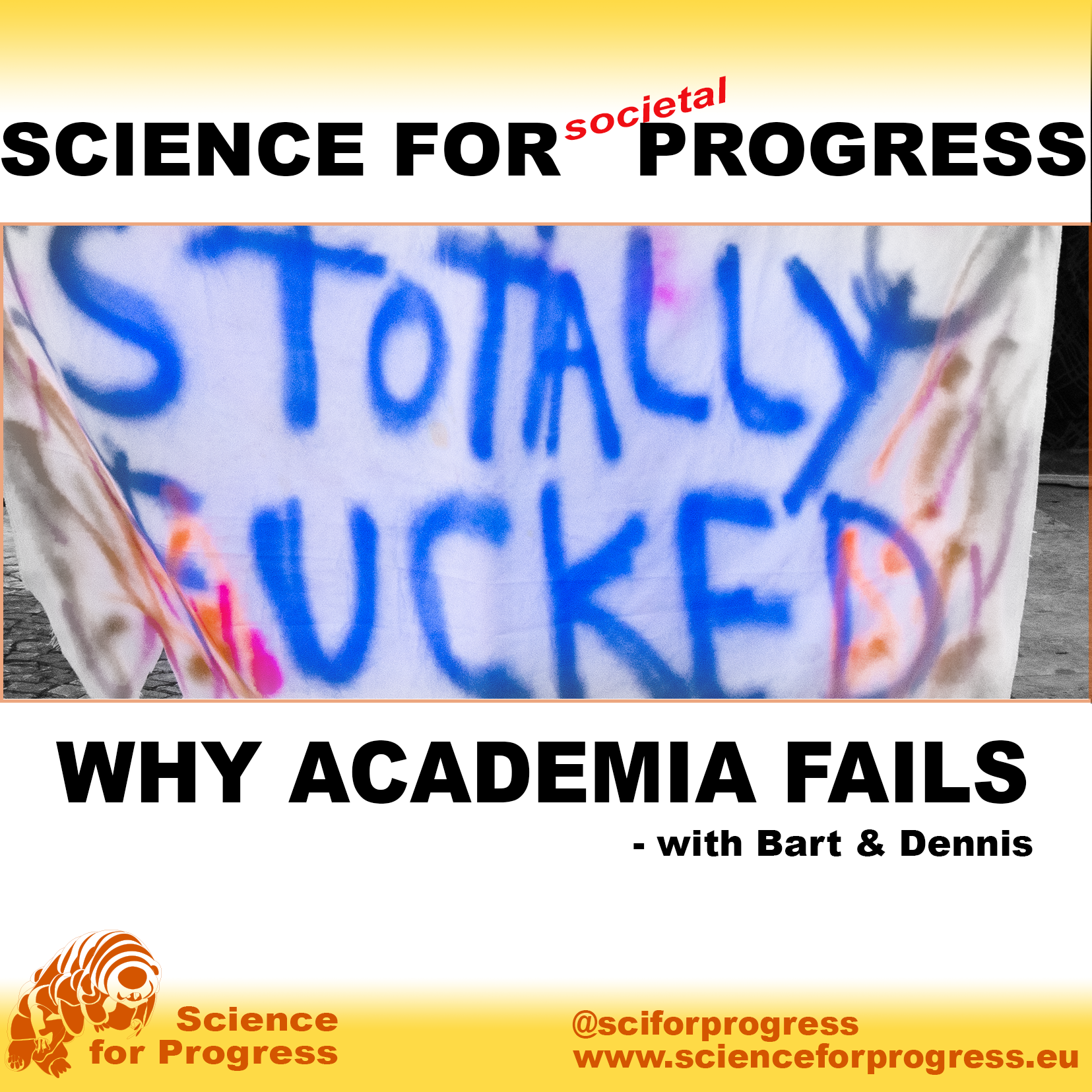
Science for Progress35 Why Academia Fails – with Bart and DennisThe main topic for this episode is Why Academia Fails… or better, what we may learn from the book “Why Nations Fail” (Acemoglu & Robinson) about the shortcomings of academia. But before we get to it, we will talk briefly about what happened over the last month - most importantly, I will give you my report on the Global Climate Strike as I experienced it in Lisbon, on September 27th.This episode is special, in the sense that we decided to make it a 2-Part episode. In this first part we basically set up the background information, and in the November talk ep...
2019-10-0600 min 2019-10-0626 min
2019-10-0626 min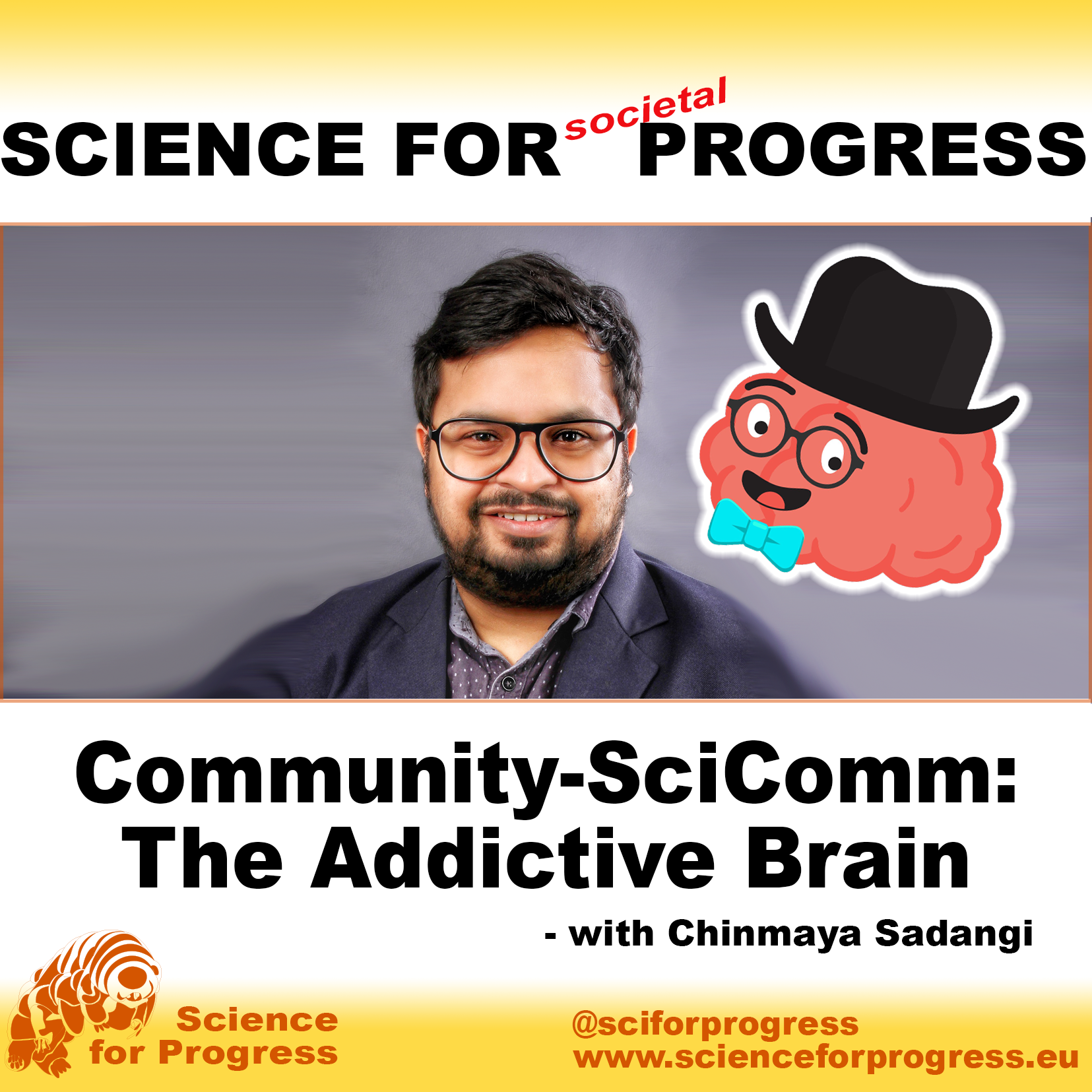
Science for Progress34 Community SciComm: The Addictive Brain – with Chinmaya SadangiIn this episode I talk with Dr. Chinmaya Sadangi about his Science Communication Project "The Addictive Brain".
Science Communication is of major importance. This becomes increasingly clear as we are witnessing the climate action demonstrations which are still being met with rather disappointing responses from the governments. Because of this, I regularly feature science communicators on this podcast. The goal is to inform academics about the possibilities of contributing to science communication. This can be done either in parallel to their academic careers, or as a career choice.
Listen to the Full Conversation on Patreon!
The Addictive Brain is a...
2019-09-2200 min
Science for Progress33 Mandatory Open Access & E****ier – with Bart & Dennis
Photo by Miriam Berger and Bart Geurten
We are back from the summer break! So, we resume the “Bart and Dennis” Talk format!
Bart and I briefly talk about Bart’s research, because he just published an article! And it appeared in a journal that is actually quite good, but it is pay-walled and published by Elsevier.
We then talk about the upcoming Open Science mandate that cOAlition S is trying to establish in Europe. cOAlition S includes some of the biggest funding agencies in Europe, like the We...
2019-09-0132 min
Science for Progress33 Mandatory Open Access & E****ier – with Bart & DennisPhoto by Miriam Berger and Bart Geurten
We are back from the summer break! So, we resume the “Bart and Dennis” Talk format!
Bart and I briefly talk about Bart’s research, because he just published an article! And it appeared in a journal that is actually quite good, but it is pay-walled and published by Elsevier.
We then talk about the upcoming Open Science mandate that cOAlition S is trying to establish in Europe. cOAlition S includes some of the biggest funding agencies in Europe, like the Wellcome Trust and the European Research Council. Yet, a lot of scientists seem t...
2019-09-0100 min 2019-09-0132 min
2019-09-0132 min
Science for Progress32 Harassment — Speak Up in Academia — with Alice HertzogThat sexual harassment, bullying, but also academic misconduct such as advisers plagiarizing their student’s work, happen in academia has never been a big secret. Rumors and scandals over the mistreatment of students, grad students, postdocs, and so on, have been accompanying my whole career. So called ‘whisper networks’ warn each other to stay away from certain professors.
And, where power differentials between members of a community are so large, abuse of power is probably not completely preventable.
Listen to the Full Conversation on Patreon!
However, many cases may indeed be preventable, and so may be many of the negative effect...
2019-08-1800 min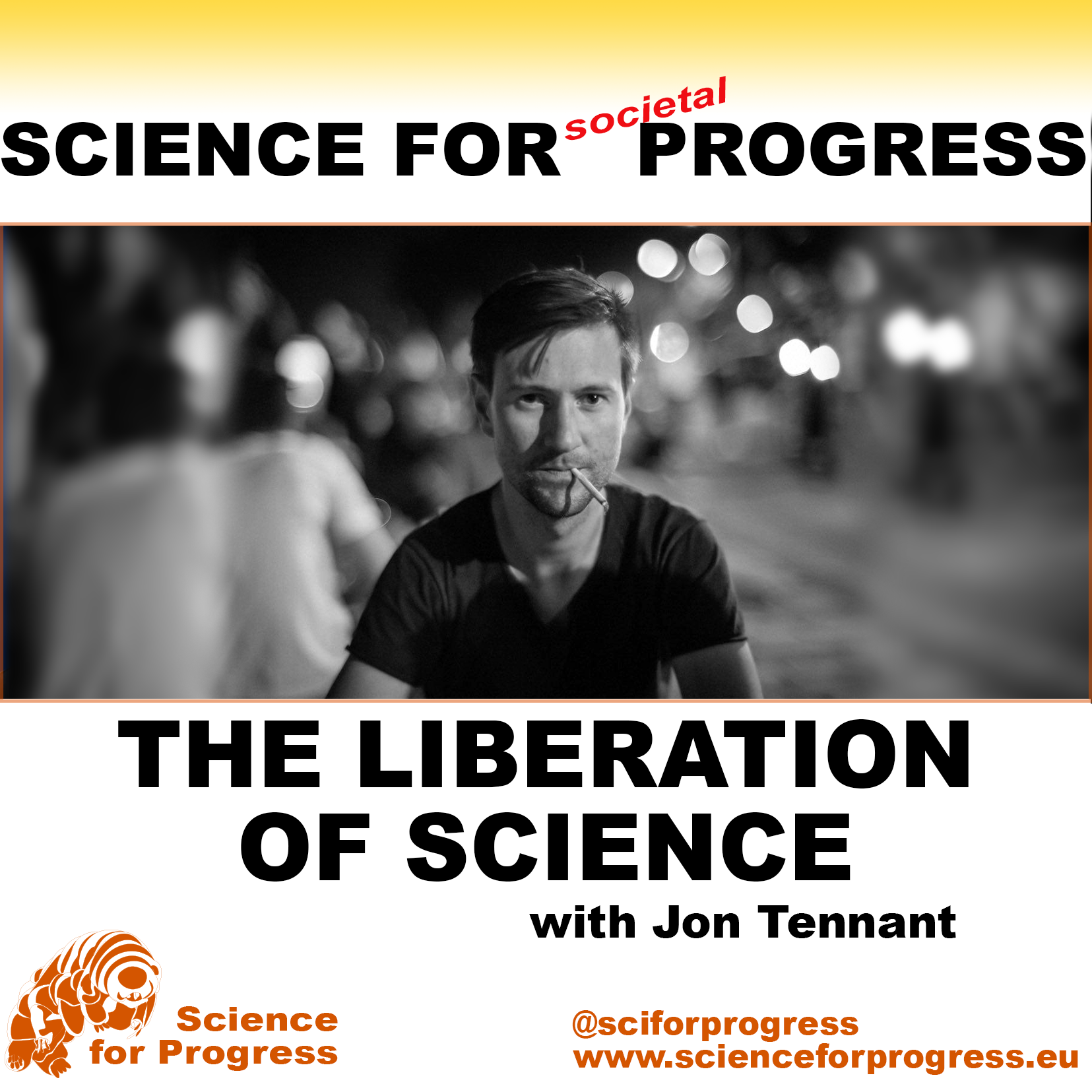
Science for Progress31 The Liberation of Science – with Jon TennantOpen science for some people it is just science done correctly. For others it is the revolutionary change in the whole academic culture. These different perspectives are highly dependent on your views on the role of science in society, who your advisers were which fields your were in, which career stages you reached, and where you live and work.
In this episode I talk with Dr. Jon Tennant about open science. He is a paleontologist who is now predominantly active in building an Open Science community. He has published several articles on open science and initiated the Open Science MOOC...
2019-07-2800 min
Science for Progress30 B&D LIVE: Pseudoscience GamePseudoscience is like a thorn in my brain. Besides being potentially dangerous when people rely on “alternative” “medicine” instead of finding actual help, sometimes it just bothers me when somebody is wrong on the internet. So it was time to relax a bit about it.
For this episode Bart and I tried something new. On Sunday, July 7th, we went on YouTube and played a game! We read pseudoscience stories to each other, trying to make the other guy laugh about it! And among the people who sent us their pseudoscience stories, we randomly chose a winner who got a t-shirt...
2019-07-1000 min
Science for Progress29 Climate Action: Energiewende – with Rüdiger EichelFor this episode I speak with Dr. Rüdiger Eichel, professor for Materials and Processes for Electrochemical Energy Conversion and Storage at the RWTH Aachen University, and Scientific Director for the Institute for Energy and Climate Research at the Research Center Jülich in Germany.
Dr. Eichel gives us an insight into the chances and challenges of the Energiewende. The new found interest in climate issues in the public that can be seen in the Fridays for Future movement and the outcomes of the EU parliament elections, make him optimistic. He now sees the chance to talk with society about th...
2019-06-2300 min
Science for Progress28 B&D: The Rise of the Greens in the EU, Homeopathy, & Postdocs
Once a month Bart Geurten and I talk about current topics in the Bart and Dennis (“B&D”) series. This time we talk about the success of the Greens in the EU parliament elections, homeopathy, and postdocs.
Announcement
And we have a big announcement: On July 7th we will do a live episode on YouTube! For the show we want to play a little game. And for this to work, we need you cooperation! Send us your weirdest/funniest parascience or pseudoscience stories or soundbites! You can...
2019-06-0940 min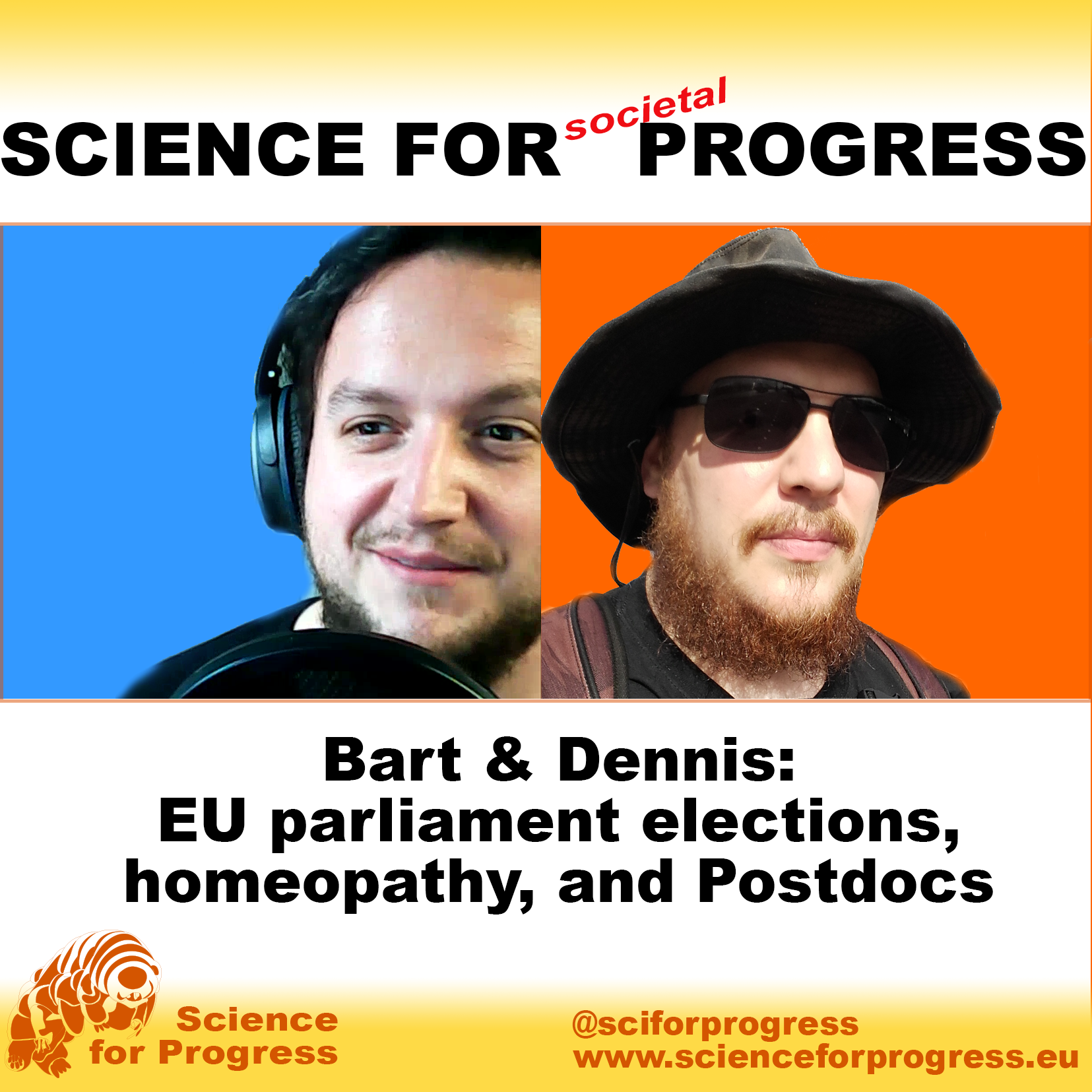
Science for Progress28 B&D: The Rise of the Greens in the EU, Homeopathy, & PostdocsOnce a month Bart Geurten and I talk about current topics in the Bart and Dennis (“B&D”) series. This time we talk about the success of the Greens in the EU parliament elections, homeopathy, and postdocs.
Announcement
And we have a big announcement: On July 7th we will do a live episode on YouTube! For the show we want to play a little game. And for this to work, we need you cooperation! Send us your weirdest/funniest parascience or pseudoscience stories or soundbites! You can support either Bart or Dennis by sending your story to bart@scienceforprorgess.eu, or d...
2019-06-0900 min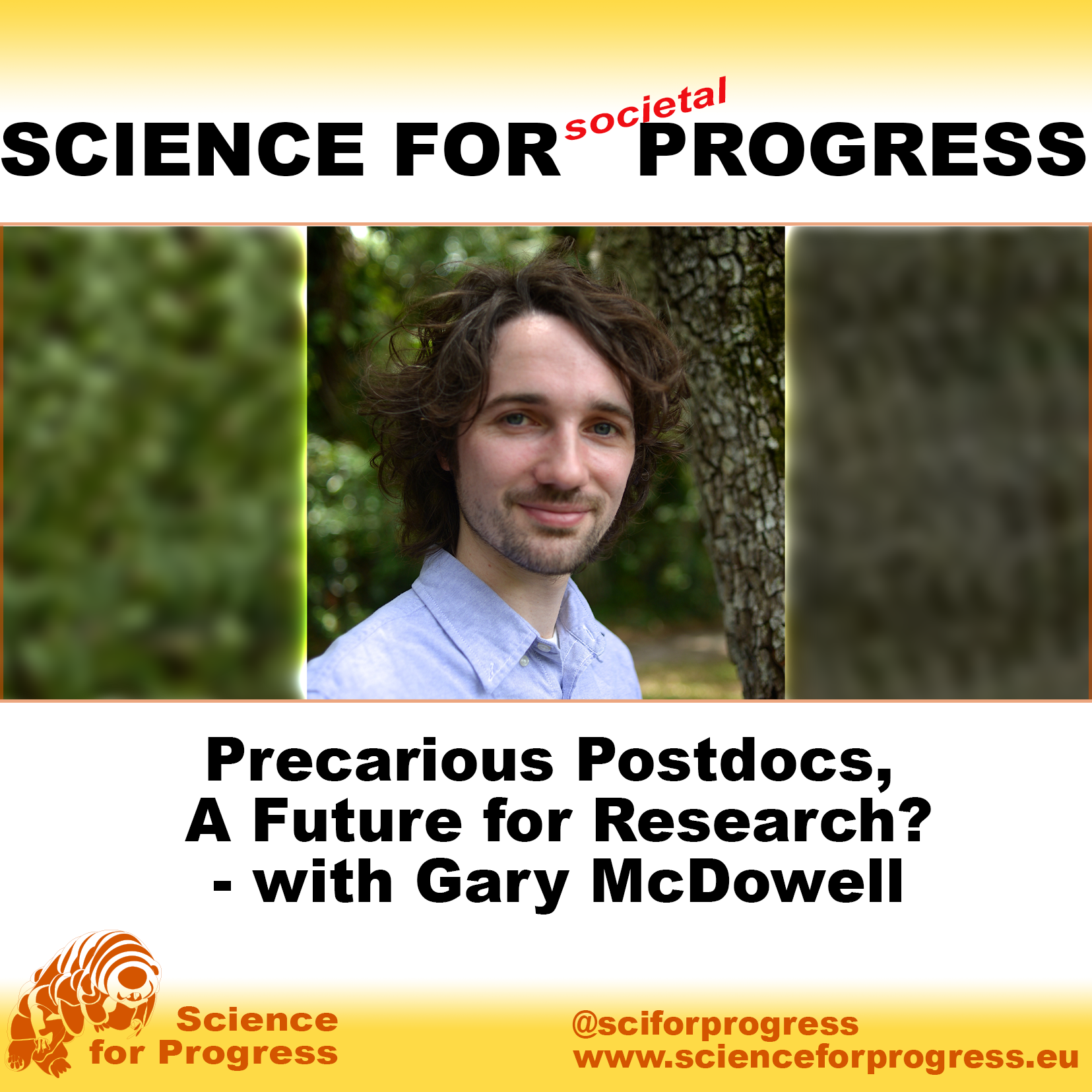
Science for Progress27 Precarious Postdocs. A Future for Research? – with Gary McDowellPostdocs are, besides graduate students, the main workforce in academic research. Following the PhD, the postdoc position is the only way to follow a research career within academia. Many PhDs around the world are advised to go to the USA for a postdoc - or two - because it is known for its large research output and high quality research institutes. Around two thirds of postdocs in the USA are foreign born.
Listen to the Full Conversation on Patreon!
In this episode I talk to Gary McDowell, a UK born scientists in protein research who over the last few years...
2019-05-2600 min
Science for Progress26 B&D: Conferences. What are they good for?
In March, Bart visited the bi-annual meeting of the German Neuroscience Society (NWG) in Göttingen. And he took his brand new digital audio recorder with him! So this is the first time we can present impressions from the field!
Bart interviewed professor Karin Nordström, graduate student Robert Kossen, and a former researcher and now entrepreneur John Stowers about what brings them to the conference, and when and why students should begin attending.
Listen to the Full Conversation on Patreon!
2019-05-1239 min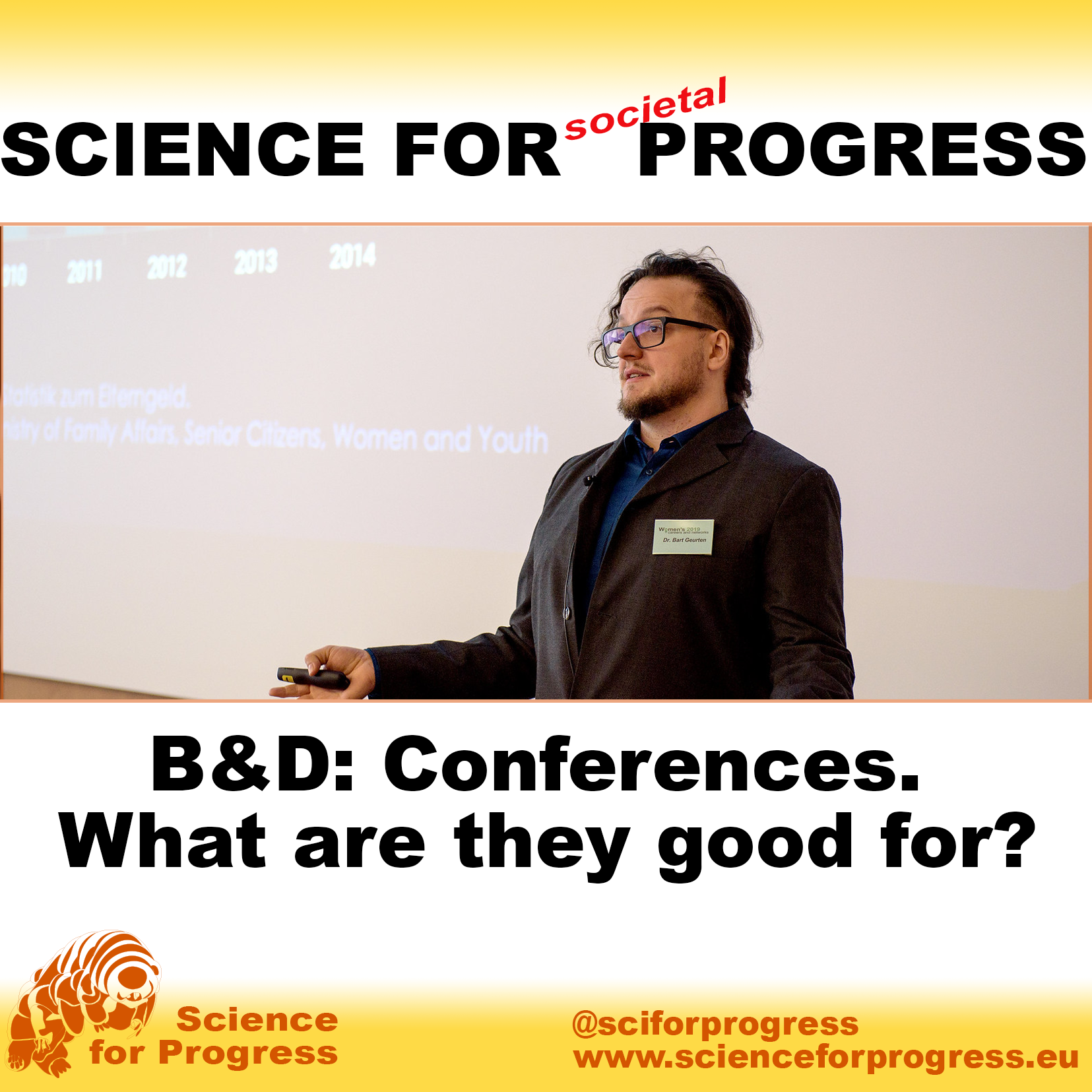
Science for Progress26 B&D: Conferences. What are they good for?In March, Bart visited the bi-annual meeting of the German Neuroscience Society (NWG) in Göttingen. And he took his brand new digital audio recorder with him! So this is the first time we can present impressions from the field!
Bart interviewed professor Karin Nordström, graduate student Robert Kossen, and a former researcher and now entrepreneur John Stowers about what brings them to the conference, and when and why students should begin attending.
Listen to the Full Conversation on Patreon!
Taking it a step further, we also highlight two conferences, the Neuroscience Doctoral Student's Workshop (NeuroDoWo), which is completely or...
2019-05-1200 min
Science for Progress25 SciComm: Pint of Science – with Elodie Chabrol
In May will be the next Pint of Science event!
Pint of Science is an annual festival that was founded by Michael Motskin and Praveen Paul. Every May scientists present their research to a public audience in a pub or a bar. It started in the UK in 2014, and it’s now spread throughout the world, with official events in 24 countries. In 2018, 120 000 people visited Pint of Science events. The events are planned by local teams, which make up the 3000 volunteers.
In this episode I spoke with Pint of...
2019-04-2833 min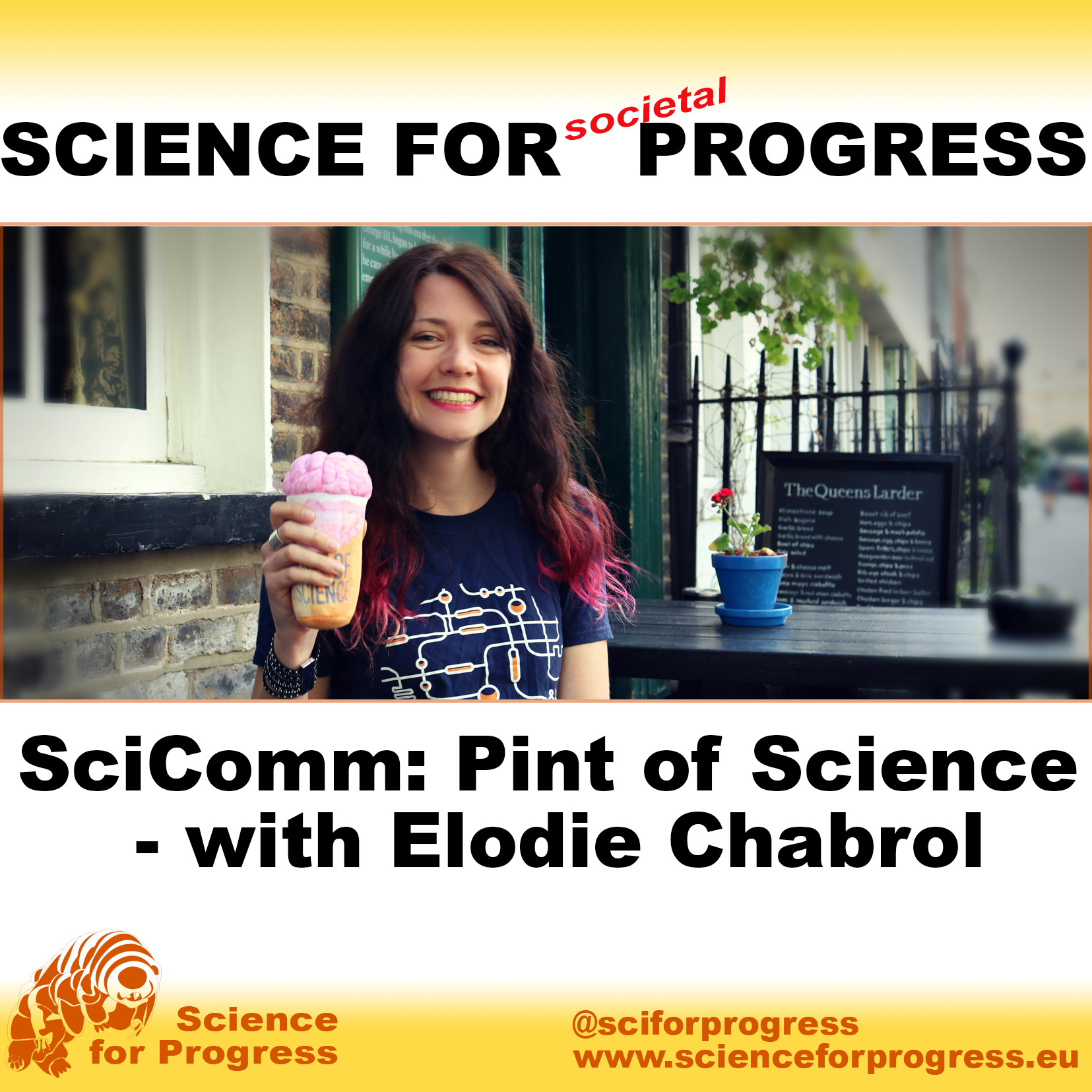
Science for Progress25 SciComm: Pint of Science – with Elodie ChabrolIn May will be the next Pint of Science event!
Pint of Science is an annual festival that was founded by Michael Motskin and Praveen Paul. Every May scientists present their research to a public audience in a pub or a bar. It started in the UK in 2014, and it’s now spread throughout the world, with official events in 24 countries. In 2018, 120 000 people visited Pint of Science events. The events are planned by local teams, which make up the 3000 volunteers.
In this episode I spoke with Pint of Science organizer Elodie Chabrol, a former neuroscience researcher, who is now a fu...
2019-04-2800 min
Science for Progress24 Brexit: Its Impacts on Science and Scientists – B&D with guests
Bart and I invited three scientists from both sides of the canal to talk about Brexit and how it impacts scientists and the scientific endeavor. Our guests are Andrew Phillipides (British citizen, and professor at Sussex University, UK), Thomas Nowotny (German citizen, and professor at Sussex University, UK), and Clare Hancock (British citizen, and PhD student at Göttingen University, Germany).
Listen to the Full Conversation on Patreon!
The goal of the EU is to promote peace, freedom, security and justice, sustainable development, s...
2019-04-1551 min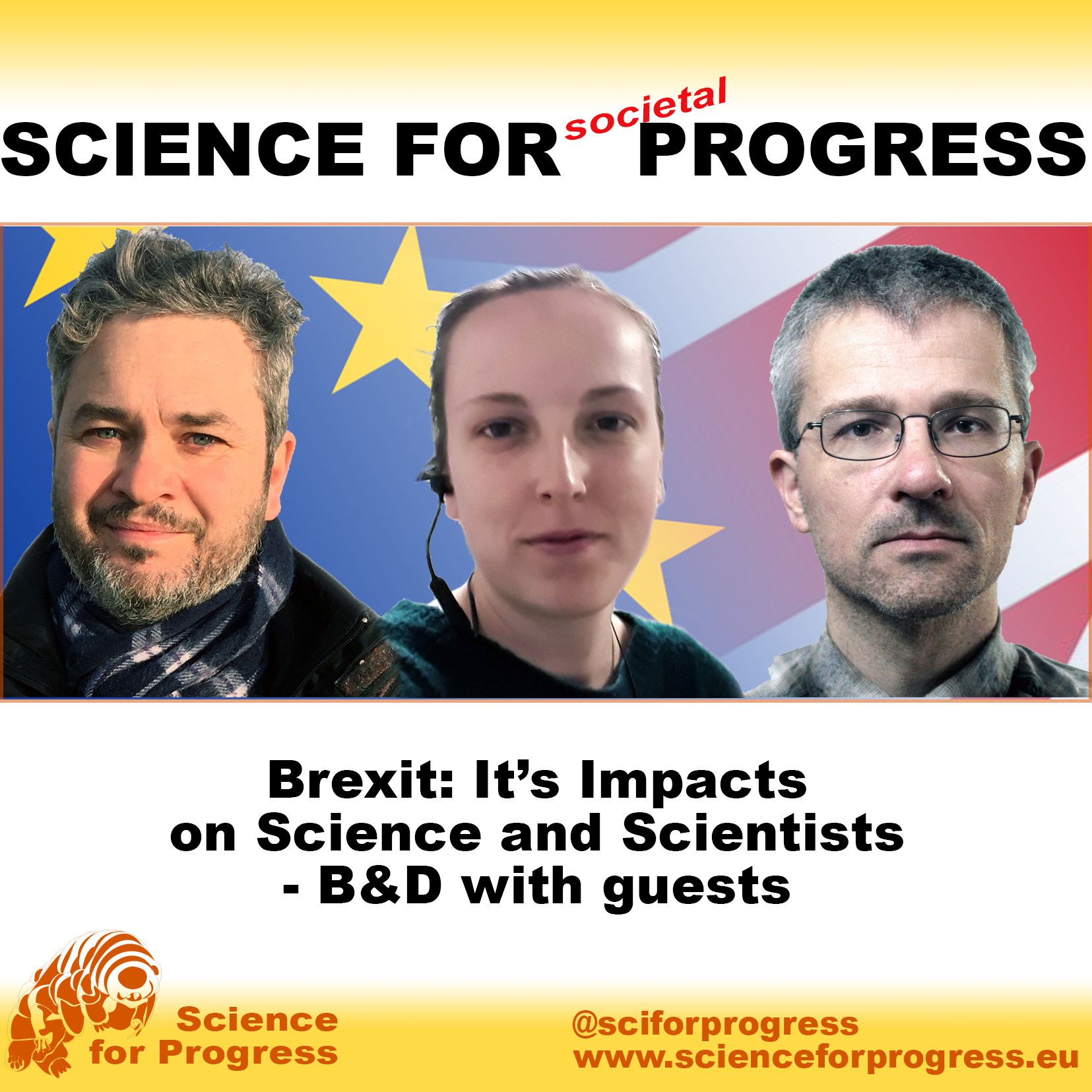
Science for Progress24 Brexit: Its Impacts on Science and Scientists – B&D with guestsBart and I invited three scientists from both sides of the canal to talk about Brexit and how it impacts scientists and the scientific endeavor. Our guests are Andrew Phillipides (British citizen, and professor at Sussex University, UK), Thomas Nowotny (German citizen, and professor at Sussex University, UK), and Clare Hancock (British citizen, and PhD student at Göttingen University, Germany).
Listen to the Full Conversation on Patreon!
The goal of the EU is to promote peace, freedom, security and justice, sustainable development, social inclusion, cohesion and solidarity among member states, to respect cultural diversity, to establish an economic and m...
2019-04-1500 min
Science for Progress23 Don’t ‘Sleep Faster’ – with Lars DittrichArnold Schwarzenegger famously (and half-jokingly) proclaimed that if you need more than 6 hours of sleep, you should sleep faster. Many successful people claim to sleep very little and use the extra time to be productive.
But is this sound advise? I talked with Dr. Lars Dittrich, neuroscientist and former sleep researcher, about sleep.
Lars answer questions like What does sleep do? How is it regulated? What are the side-effects of acute and chronic sleep deprivation? How do I know if I sleep enough? How could sleep research inform policies and business practices?
Listen to the Full Conversation on Patreon!
Summary
...
2019-03-3100 min
Science for Progress23 Don’t ‘Sleep Faster’ – with Lars Dittrich
Arnold Schwarzenegger famously (and half-jokingly) proclaimed that if you need more than 6 hours of sleep, you should sleep faster. Many successful people claim to sleep very little and use the extra time to be productive.
But is this sound advise? I talked with Dr. Lars Dittrich, neuroscientist and former sleep researcher, about sleep.
Lars answer questions like What does sleep do? How is it regulated? What are the side-effects of acute and chronic sleep deprivation? How do I know if I sleep enough? How could...
2019-03-3139 min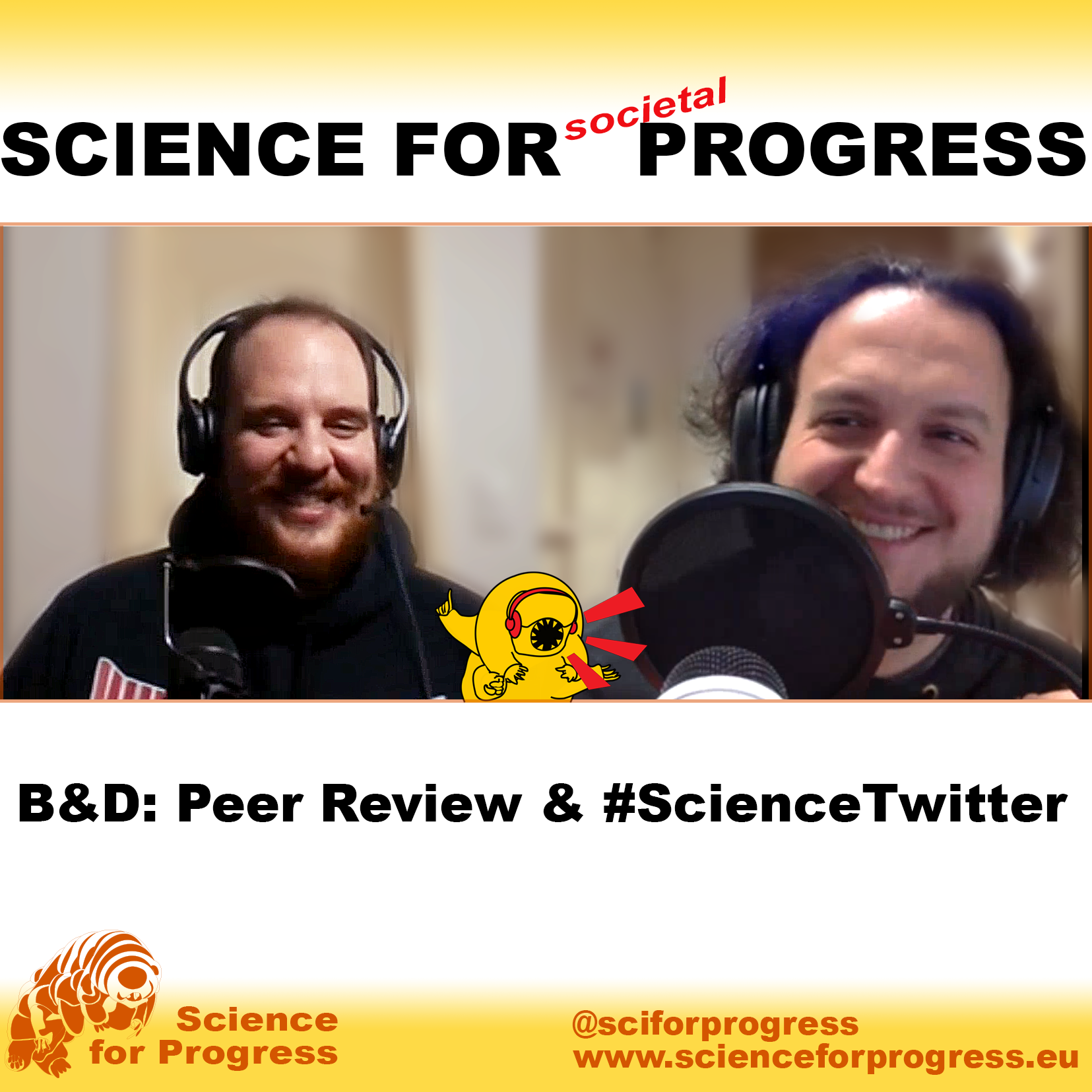
Science for Progress22 B&D: Peer Review & #ScienceTwitterIn this episode we talk about our experience with peer review and the importance of kindness and the advantages and disadvantages of the authors knowing the identity of peer reviewers. And in the second part we talk about how twitter can be a great place for science and scientists!
Listen to the Full Conversation on Patreon!
Peer Review
Peer review can be a pretty tense process. We talk about how misunderstandings can lead to very negative reviews, and how authors a prone to take critique personally. As a reviewer Bart suggests to use the "shit sandwich" approach, where you "sandwich"...
2019-03-1700 min
Science for Progress22 B&D: Peer Review & #ScienceTwitter
In this episode we talk about our experience with peer review and the importance of kindness and the advantages and disadvantages of the authors knowing the identity of peer reviewers. And in the second part we talk about how twitter can be a great place for science and scientists!
Listen to the Full Conversation on Patreon!
Peer Review
Peer review can be a pretty tense process. We talk about how misunderstandings can lead to very negative reviews, and how...
2019-03-1745 min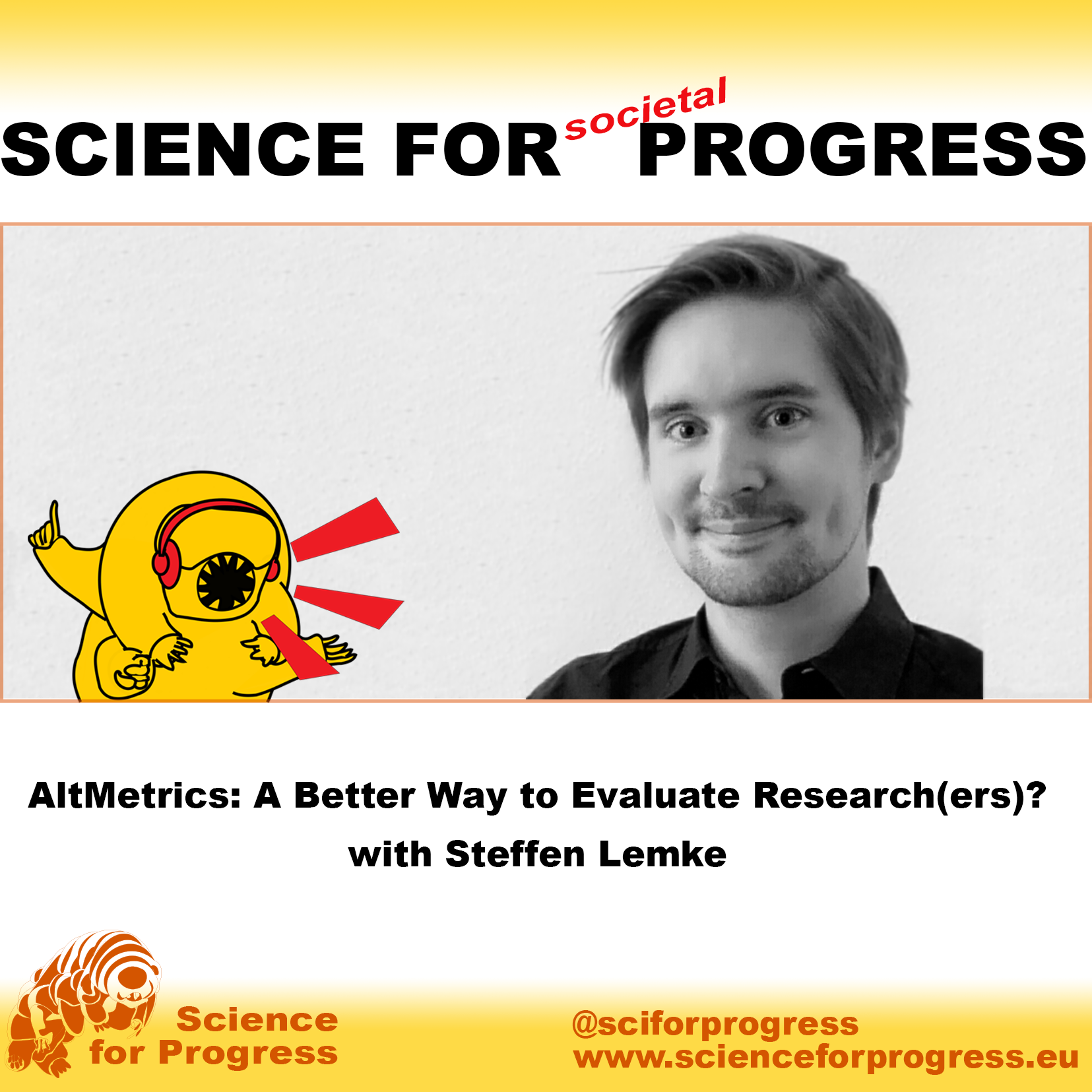
Science for Progress21 Altmetrics: A Better Way to Evaluate Research(ers)? – with Steffen LemkeWho gets positions and funding in academia should depend on the merit of the researcher, project, or institute. But how do we assess these merits fairly, meaningfully and in a way that makes it comparable?
I talked about metrics with Steffen Lemke, PhD student at the Leibniz Information Centre for Economics (ZBW), in Kiel, Germany. He is part of the *metrics project, which investigates new research metrics and their applicability. The project is funded by the German Researcher Association, DFG.
Listen to the Full Conversation on Patreon!
Citation Based Metrics
In episode 9 I talked with Björn Brembs about the m...
2019-03-0300 min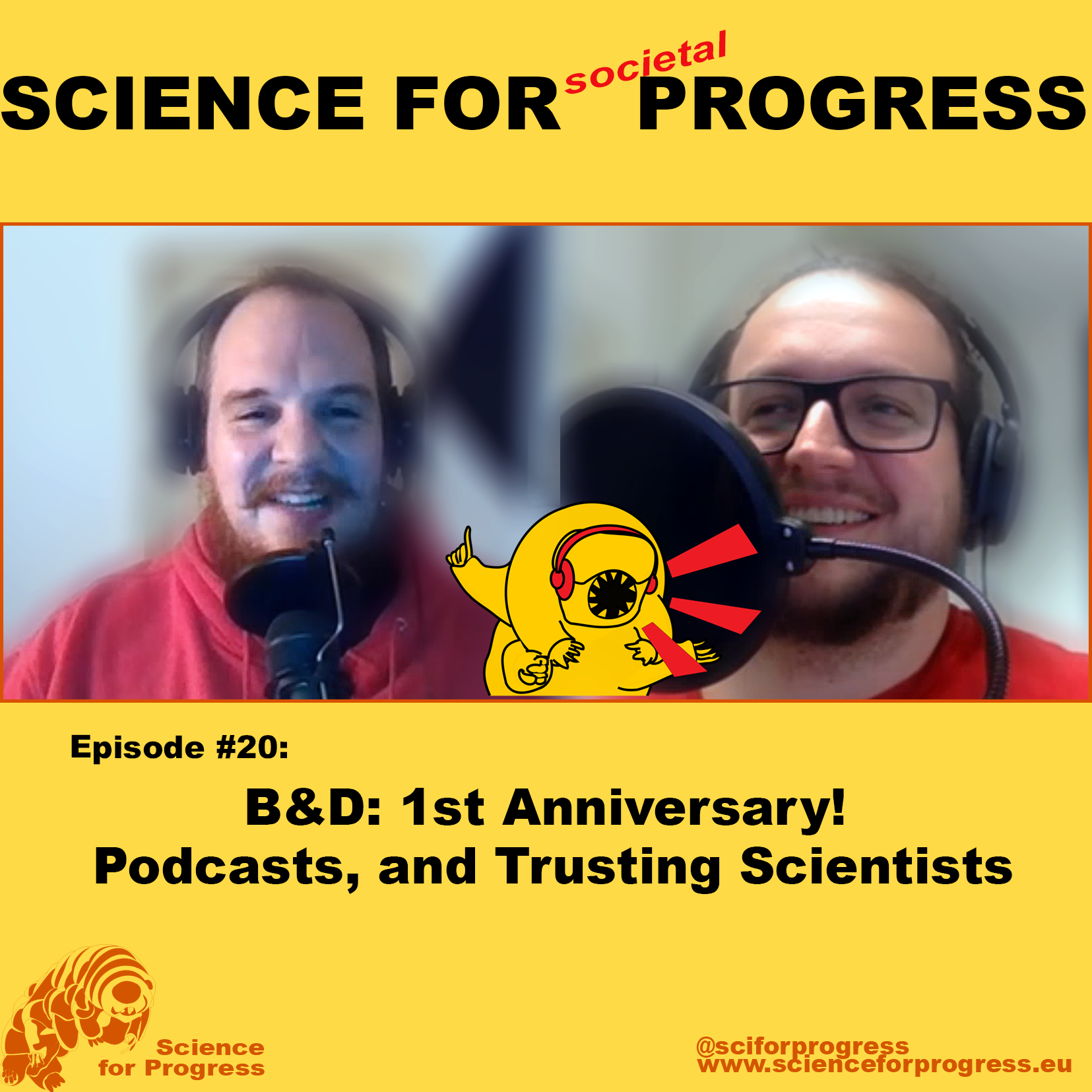
Science for Progress20 B&D: 1st Anniversary! Podcasts, and Trusting ScientistsThis episode of Bart and Dennis Talk is actually our first anniversary episode! While Science for Progress was founded in July 2017, the podcast went online on February 20th 2018!
Announcement
At the beginning of the episode I announce that I will be on the Twitter “rotating curation account” @RecovingAcad, which belongs to the Recovering Academic Podcast. We had a crossover episode with them, last November. I will be tweeting about leaving academia and transitioning into industry from February 25th to March 2nd.
On March 3rd I will do a live video AMA on the account @theaddictivebrain on Instagram. Addictive Brain is a sc...
2019-02-2600 min
Science for Progress20 B&D: 1st Anniversary! Podcasts, and Trusting Scientists
This episode of Bart and Dennis Talk is actually our first anniversary episode! While Science for Progress was founded in July 2017, the podcast went online on February 20th 2018!
Announcement
At the beginning of the episode I announce that I will be on the Twitter “rotating curation account” @RecovingAcad, which belongs to the Recovering Academic Podcast. We had a crossover episode with them, last November. I will be tweeting about leaving academia and transitioning into industry from February 25th to March 2nd.
On March 3rd I...
2019-02-2649 min
Science for Progress19 Insecurity and Uncertainties for Early Career Academics – with Maria Pinto
Academics are Spoiled. Right?
The stereotype of academics is that they live a well protected life in the ivory tower. But this is not the case for most of them. Maria Pinto from Portugal is a PhD student in marine microbiology in Austria. With the final stages of her work approaching, Maria is beginning to think about the future.
Forgoing Salaries, Benefits, and Life Planning Security in your Late 20s to 40s.
We talk about the many uncertainties in academia, particularly for early...
2019-02-0327 min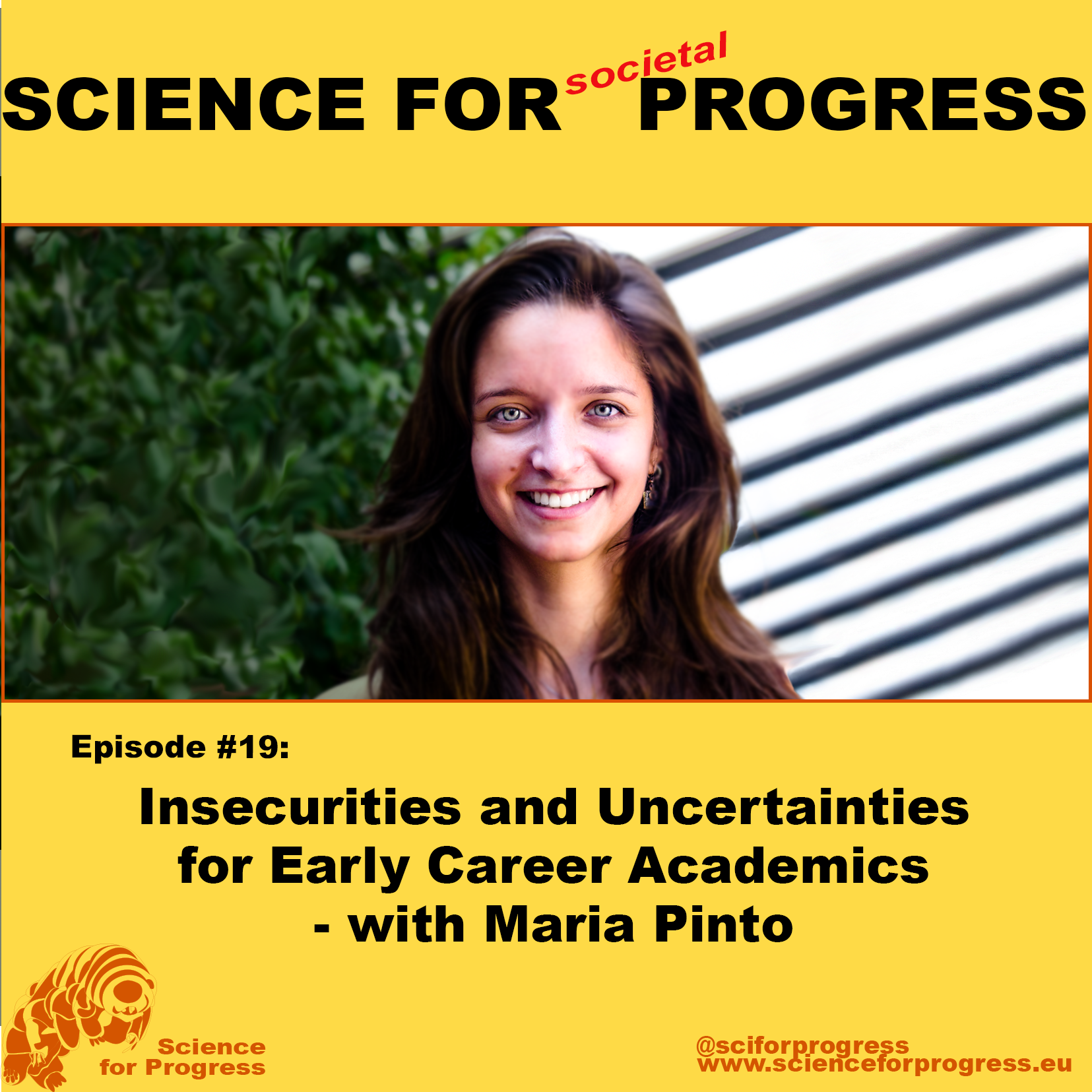
Science for Progress19 Insecurity and Uncertainties for Early Career Academics – with Maria PintoAcademics are Spoiled. Right?
The stereotype of academics is that they live a well protected life in the ivory tower. But this is not the case for most of them. Maria Pinto from Portugal is a PhD student in marine microbiology in Austria. With the final stages of her work approaching, Maria is beginning to think about the future.
Forgoing Salaries, Benefits, and Life Planning Security in your Late 20s to 40s.
We talk about the many uncertainties in academia, particularly for early career researchers. In general the salaries are not good, but in poorer countries, where the salaries are...
2019-02-0300 min
Science for Progress18 B&D Animal Use and Statistics of Equivalence
In the light of the latest animal use numbers in Germany (2017), Bart and I are having a conversation about animal use in fundamental research. We then move on to talk about a new statistical method that might help researchers get some of their data out of their drawers and into an article!
Listen to the Full Conversation on Patreon!
Animal Use in Germany 2017
Numbers in short (as presented by tagesschau.de):
* Total: > 2 Million* 1.37 Million...
2019-01-2032 min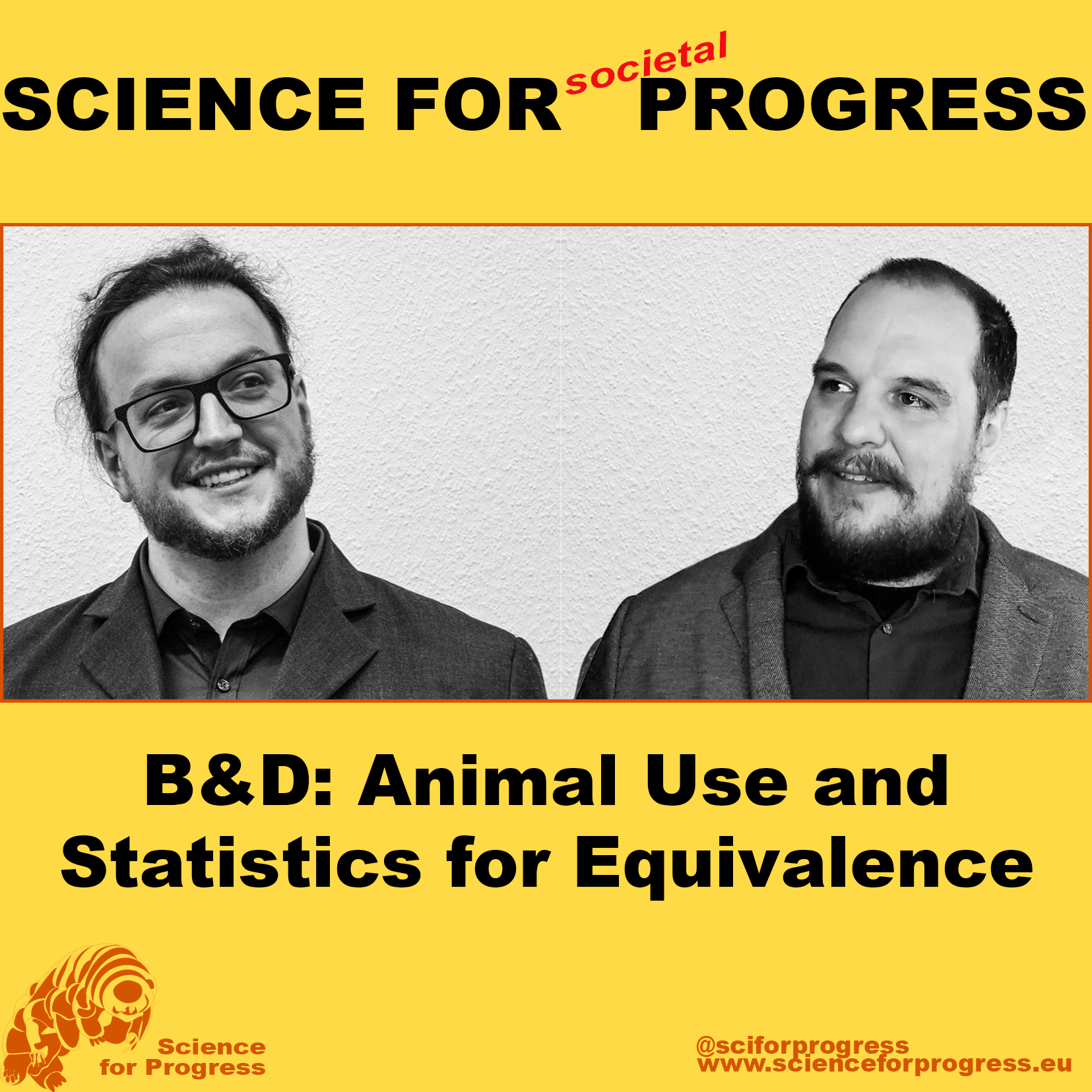
Science for Progress18 B&D Animal Use and Statistics of EquivalenceIn the light of the latest animal use numbers in Germany (2017), Bart and I are having a conversation about animal use in fundamental research. We then move on to talk about a new statistical method that might help researchers get some of their data out of their drawers and into an article!
Listen to the Full Conversation on Patreon!
Animal Use in Germany 2017
Numbers in short (as presented by tagesschau.de):
Total: > 2 Million1.37 Million Mice255.000 rats240.000 fish3300 dogs718 cats3472 monkeys50% for fundamental research27% drug production and testing15% for disease research740.000 animals were killed for organ examination
Bart and I regularly...
2019-01-2000 min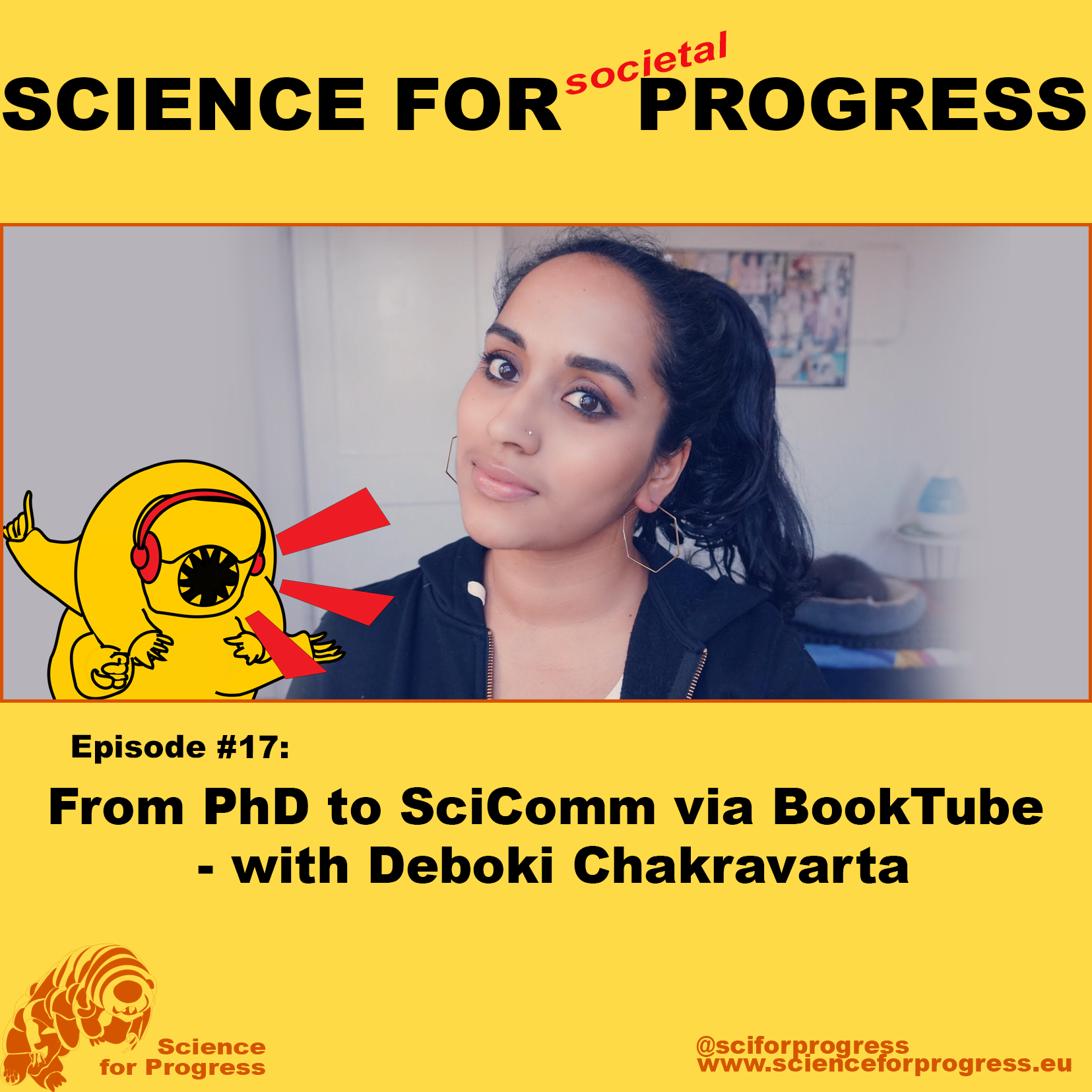
Science for Progress17 From PhD to SciComm via BookTube – with Deboki ChakravartiScience Communication is one way academics can apply themselves outside of academia. But how does one transition between careers? I talked with Dr. Deboki Chakravarti, a biomedical engineer who worked on cancer treatments. She graduated in 2018 and then did an internship with Scientific American, a leading brand in Science Communication in the USA.
First we learn a little bit about her scientific work, and her personal experiences in graduate school. Already during graduate school she began a YouTube channel about books and life as a graduate student. She then shares why she decided to leave academia, and she explains how...
2019-01-0600 min
Science for Progress16 B&D: CRISPR Babies
At the end of November 2018, Chinese scientist He Jiankui announced that he had genetically modified human embryos which were then brought to term. The resulting twin sisters appear to be healthy. But this experiment was not greeted with enthusiasm by the scientific community.
The critique attacks every aspect of the experiment: the treatment’s medical necessity, the reasoning behind the treatment approach, the way it was conducted, the ethical implications, and it also wasn’t legal.
Listen to the Full Conversation on Patreon!
2018-12-2337 min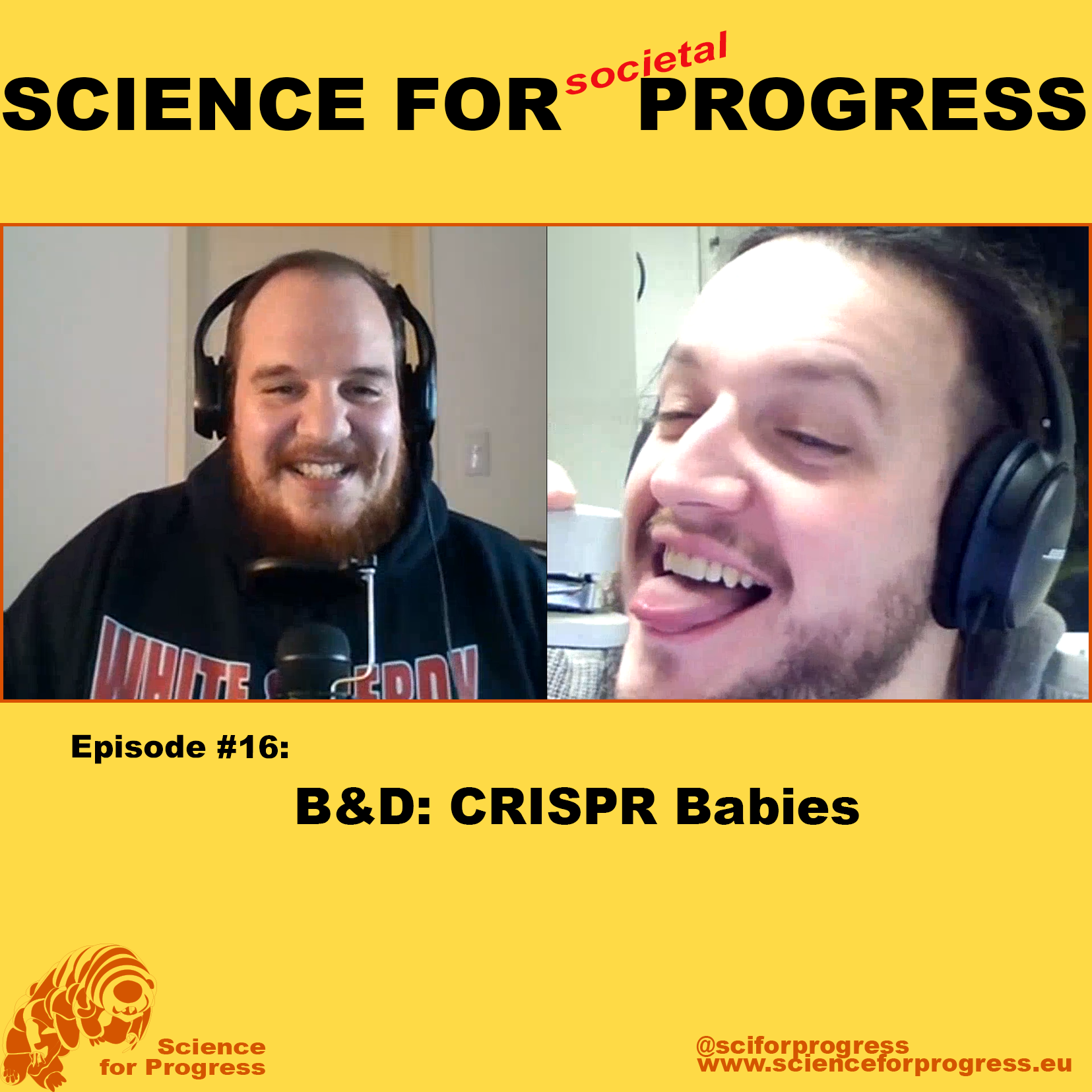
Science for Progress16 B&D: CRISPR BabiesAt the end of November 2018, Chinese scientist He Jiankui announced that he had genetically modified human embryos which were then brought to term. The resulting twin sisters appear to be healthy. But this experiment was not greeted with enthusiasm by the scientific community.
The critique attacks every aspect of the experiment: the treatment’s medical necessity, the reasoning behind the treatment approach, the way it was conducted, the ethical implications, and it also wasn’t legal.
Listen to the Full Conversation on Patreon!
He Jiankui was aware that he was doing something the public and the scientific community would not agre...
2018-12-2300 min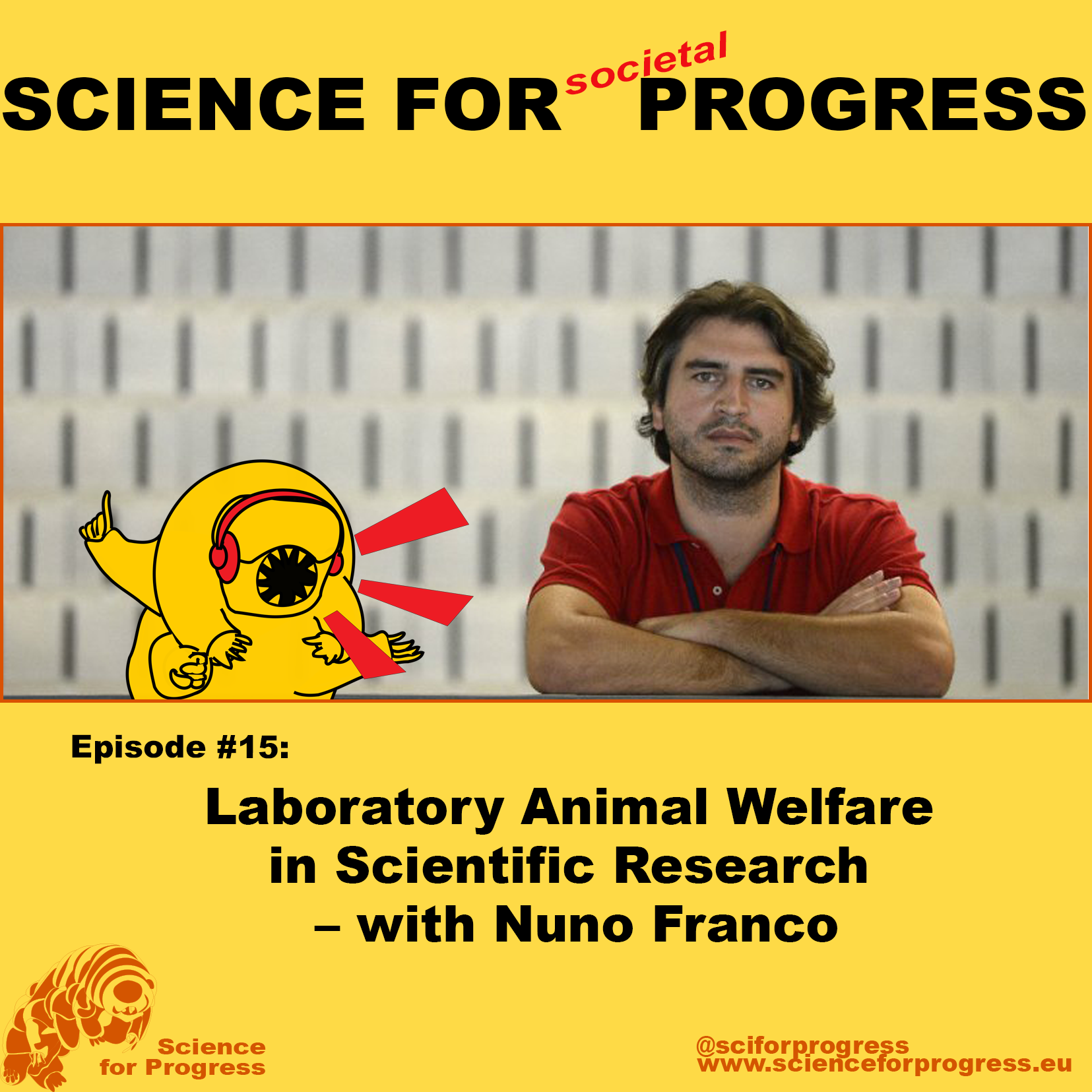
Science for Societal Progress15 – Animal Welfare in Scientific Research – with Nuno FrancoI talked with Dr. Nuno Henrique Franco about animal welfare in scientific research. The questions we address are Why do we do animal experiments? What can be done to reduce the amount of animal experiments? What are the regulations for animal research? What do scientists think about the ethics of animal experimentation? What is being done for outreach? Nuno Franco is an expert on animal wellbeing in scientific research. He works as an assistant researcher at the “Instituto de Investigação e Inovação em Saúde†(Institute for Health Investigation and Innovation), or short i3S in Porto, Por...
2018-12-0932 min
Science for Progress15 Animal Welfare in Scientific Research – with Nuno FrancoI talked with Dr. Nuno Henrique Franco about animal welfare in scientific research. The questions we address are
Why do we do animal experiments?What can be done to reduce the amount of animal experiments?What are the regulations for animal research?What do scientists think about the ethics of animal experimentation?What is being done for outreach?
Listen to the Full Conversation on Patreon!
Nuno Franco is an expert on animal wellbeing in scientific research. He works as an assistant researcher at the “Instituto de Investigação e Inovação em Saúde” (Institute for Health Investigation and Innovation), or short...
2018-12-0900 min
Science for Progress14 B&D: Journals, SciComm, and GMOsOnce a month I sit down with my friend and co-host Bart Geurten. We talk about things within and around academia, and exchange opinions on earlier episodes.
In this episode, we first talk about the concept of overlay journals in the context of the newly founded community based journal "Neurons, Behavior, Data Analysis, and Theory". NBDT is a journal for computational neuroscience, and it's community lead, completely free, open, and not for profit.
We then talk about the role researchers should play in the dissemination of science to the public. This discussion has been on the internet for a while...
2018-11-2500 min
Science for Progress14 B&D: Journals, SciComm, and GMOs
Once a month I sit down with my friend and co-host Bart Geurten. We talk about things within and around academia, and exchange opinions on earlier episodes.
In this episode, we first talk about the concept of overlay journals in the context of the newly founded community based journal "Neurons, Behavior, Data Analysis, and Theory". NBDT is a journal for computational neuroscience, and it's community lead, completely free, open, and not for profit.
We then talk about the role researchers should play in the dissemination of...
2018-11-2538 min
Science for Societal Progress14 B&D: Journals, SciComm, and GMOsOnce a month I sit down with my friend and co-host Bart Geurten. We talk about things within and around academia, and exchange opinions on earlier episodes. In this episode, we first talk about the concept of overlay journals in the context of the newly founded community based journal “Neurons, Behavior, Data Analysis, and Theory”. NBDT is a journal for computational neuroscience, and it’s community lead, completely free, open, and not for profit. We then talk about the role researchers should play in the dissemination of science to the public. This discussion has been on the...
2018-11-2538 min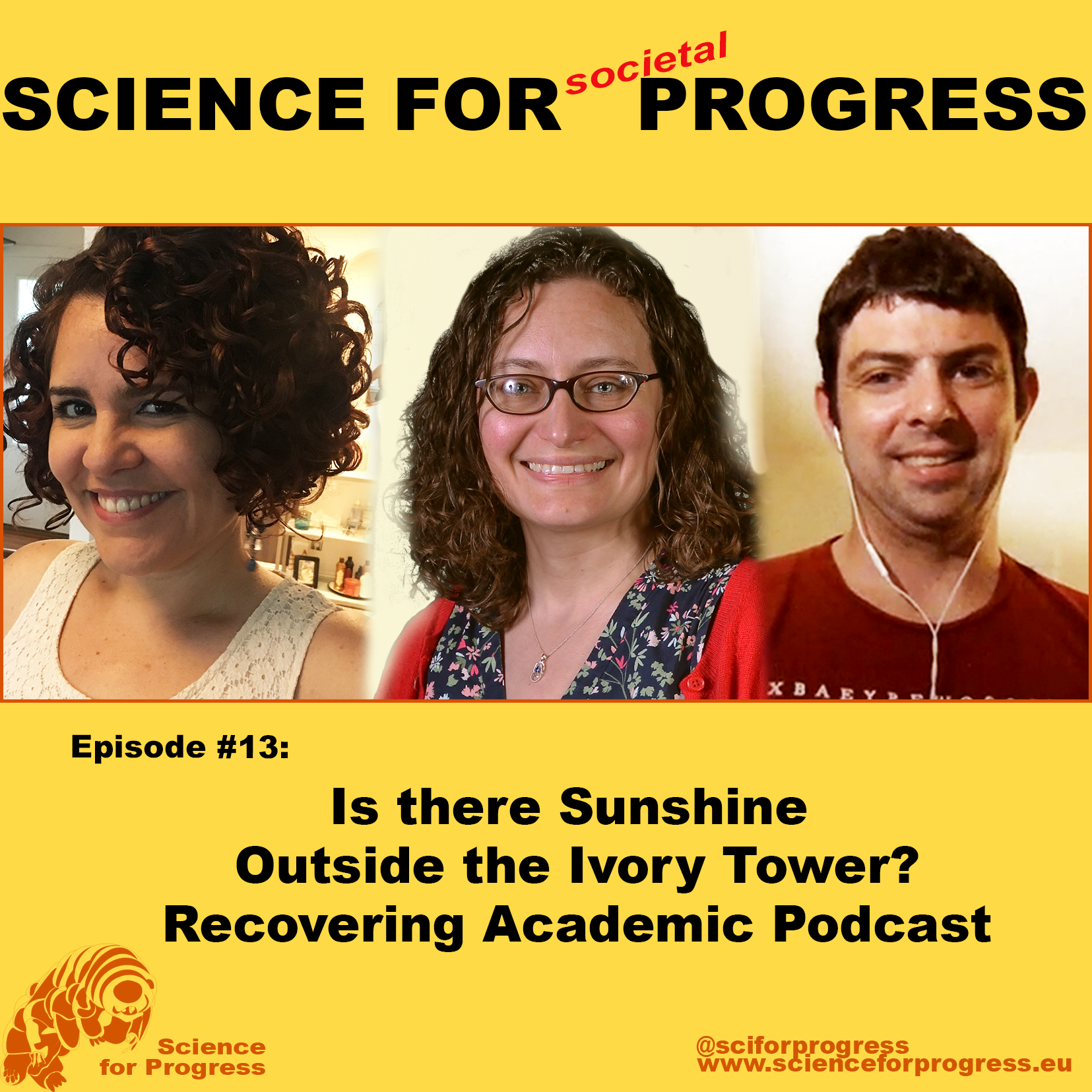
Science for Progress13 Is there Sunshine Outside the Ivory Tower? – The Recovering Academic PodcastWhile the number of PhD graduates per year is rising worldwide, the number of proper long-term or permanent positions in academia isn't. This leaves PhDs with ever decreasing chances of staying in academia. And it means that increasing numbers PhDs stay postdocs for a decade or longer, only to have to leave after all.
Listen to the Full Conversation on Patreon!
Amanda (center in the picture), Cleyde (left in picture), and Ian (right in picture) are three former life science postdocs who left academia between 2015 and 2017. When transitioning, they felt isolated from their peer groups who were predominantly academics. They...
2018-11-1100 min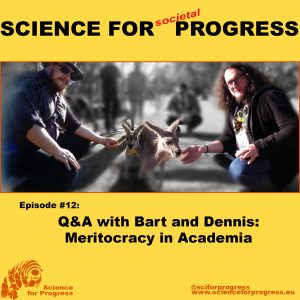
Science for Progress12 Q&A Meritocracy in AcademiaThis episode is the first 'Q&A' episode, where my new co-host Dr. Bart Geurten (see episode 8) and I talk about what's new in academia. Our conversations are free form and may lead us astray here and there.
We discuss the concept of 'merit' in the natural sciences. And we begin with a quick recap on episode 9, where I talked to Dr. Björn Brembs about the Journal Impact Factor (JIF). The JIF is a metric designed to measure the impact a journal had in the scientific community. There are many problems with how JIFs are generated. What is even w...
2018-10-2800 min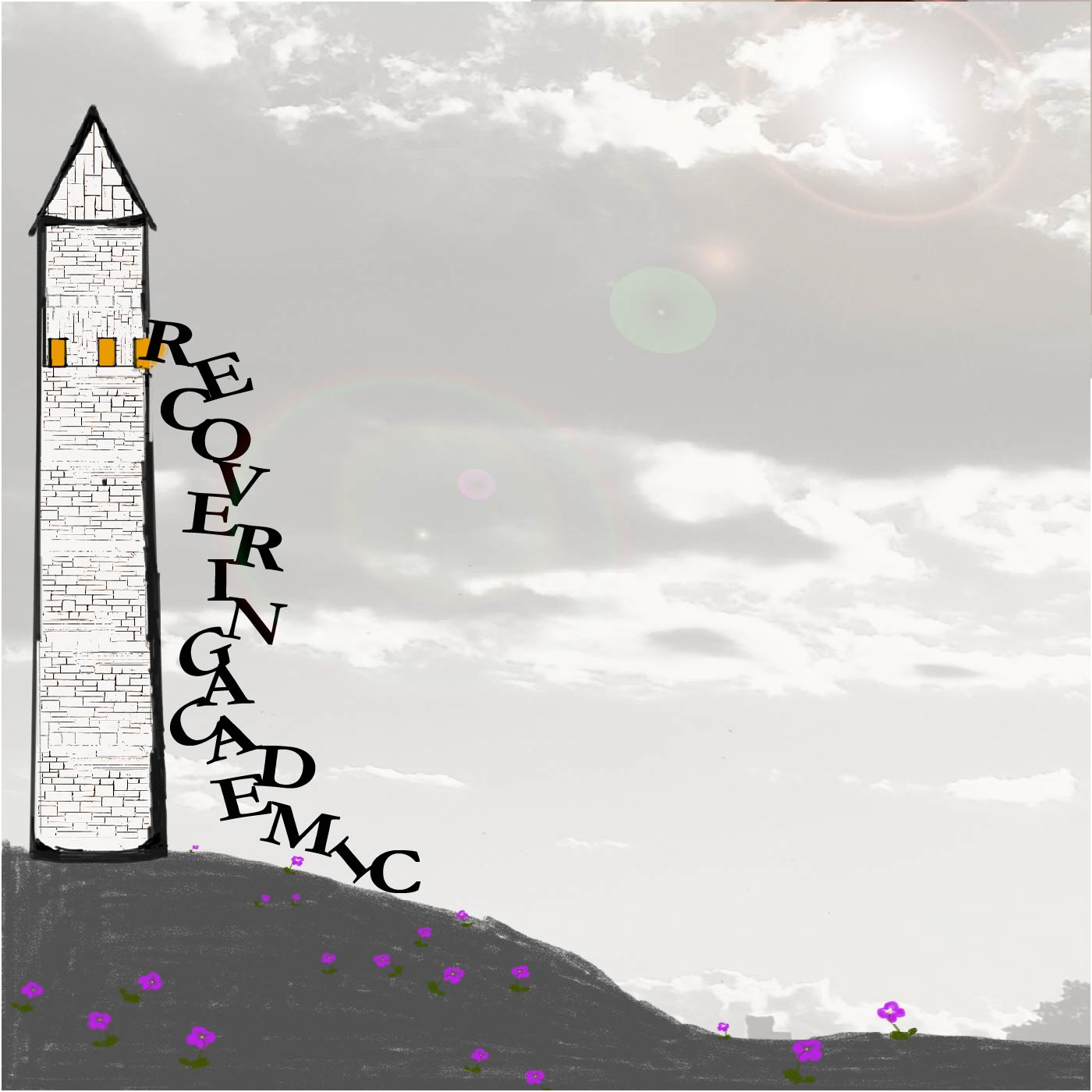
Recovering AcademicSeason 3 Episode 4: Interview with Dennis EckmeierIn this week of the Recovering Academic podcast we talk with Dr. Dennis Eckmeier, his journey outside academia and his actual advocacy projects, including the Science for Progress podcast and its twitter rotating twitter account @SfPRocur.
This was a joint podcast between the Recovering Academic and the Science for Progress podcasts, so we all discuss our reasons for leaving academia and realized Amanda was the only one of us that never did any experiments in the dark!
There's always the transition period, but after you decide that you're going to do it, it feels good. @Doctor_PMS
One of the...
2018-10-2700 min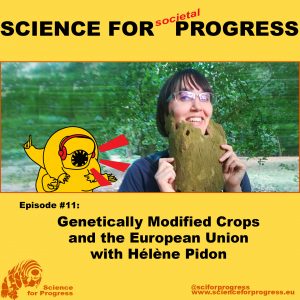
Science for Progress11: Genetically Modified Crops and the European Union – with Hélène PidonPlant geneticists are not happy with the European judgement on gene editing
Dr. Hélène Pidon is a postdoctoral researcher at the Leibniz Institute of Plant Genetics and Crop Plant Research. She searches for genes that give plants resistance to diseases. She wants to use these genes to fortify cultivated Barley against these diseases, and thus reduce the amount of pesticides used to grow the plant. When the European Court of Justice ruled on the status of crops modified with gene editing methods like CRISPR, Hélène contacted me to talk with me about GMO crops.
Listen to the...
2018-10-1400 min
Science for Societal ProgressWe are on Patreon! – and other announcements.Just some announcements this time In contrast to what was promised in the last podcast episode, we don’t have a full question and answer episode this time. I hope this will not happen too often, in future. Dennis is a freelancer now. First thing is that I quit my postdoctoral fellowship to become a freelancer. You can see how I approach this on my website. Basically I want to offer my skills and expertise in scholarship and neuroscience to help people with their academic writing, be it papers or funding ap...
2018-09-3009 min
Science for ProgressWe are on Patreon! – and other announcements.Just some announcements this time
In contrast to what was promised in the last podcast episode, we don't have a full question and answer episode this time. I hope this will not happen too often, in future.
Dennis is a freelancer now.
First thing is that I quit my postdoctoral fellowship to become a freelancer. You can see how I approach this on my website. Basically I want to offer my skills and expertise in scholarship and neuroscience to help people with their academic writing, be it papers or funding applications.
This means that I am currently a bit low...
2018-09-3000 min
Science for ProgressWe are on Patreon! – and other announcements.Just some announcements this time
In contrast to what was promised in the last podcast episode, we don't have a full question and answer episode this time. I hope this will not happen too often, in future.
Dennis is a freelancer now.
First thing is that I quit my postdoctoral fellowship to become a freelancer. You can see how I approach this on my website. Basically I want to offer my skills and expertise in scholarship and neuroscience to help people with their academic writing, be it papers or funding applications.
This means that...
2018-09-3009 min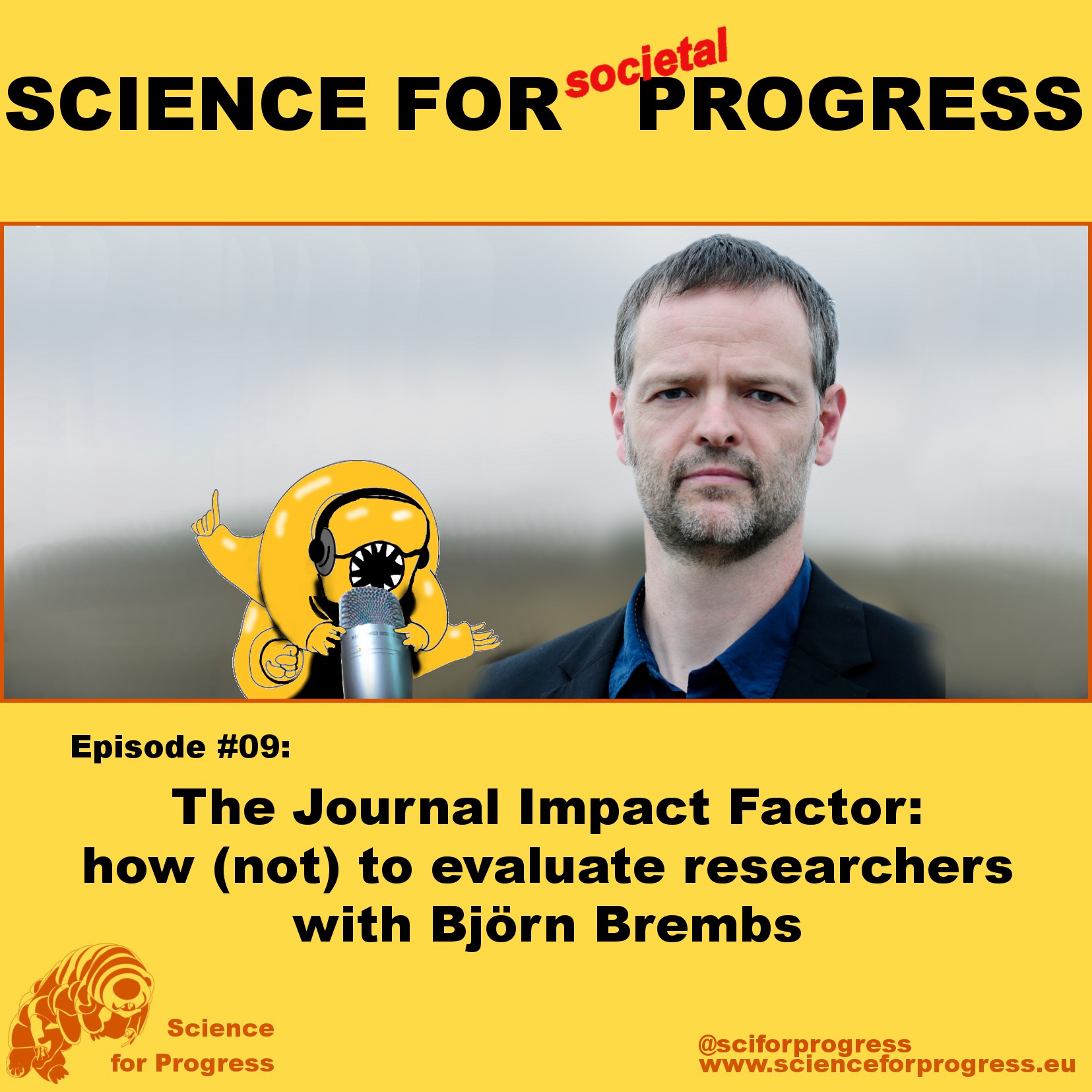
Science for Progress9: The Journal Impact Factor: how (not) to evaluate researchers – with Björn BrembsWhat is the Journal Impact Factor?
The Journal Impact Factor is widely used as a tool to evaluate studies, and researchers. It supposedly measures the quality of a journal by scoring how many citations an average article in this journal achieves. Committees making hiring and funding decisions use the 'JIF' as an approximation for the quality of the work a researcher has published, and in extension as an approximation for the capabilities of an applicant.
Listen to the Full Conversation on Patreon!
JIF as a measure of researcher merit
I find this practice already highly questionable. First of all, it...
2018-09-1600 min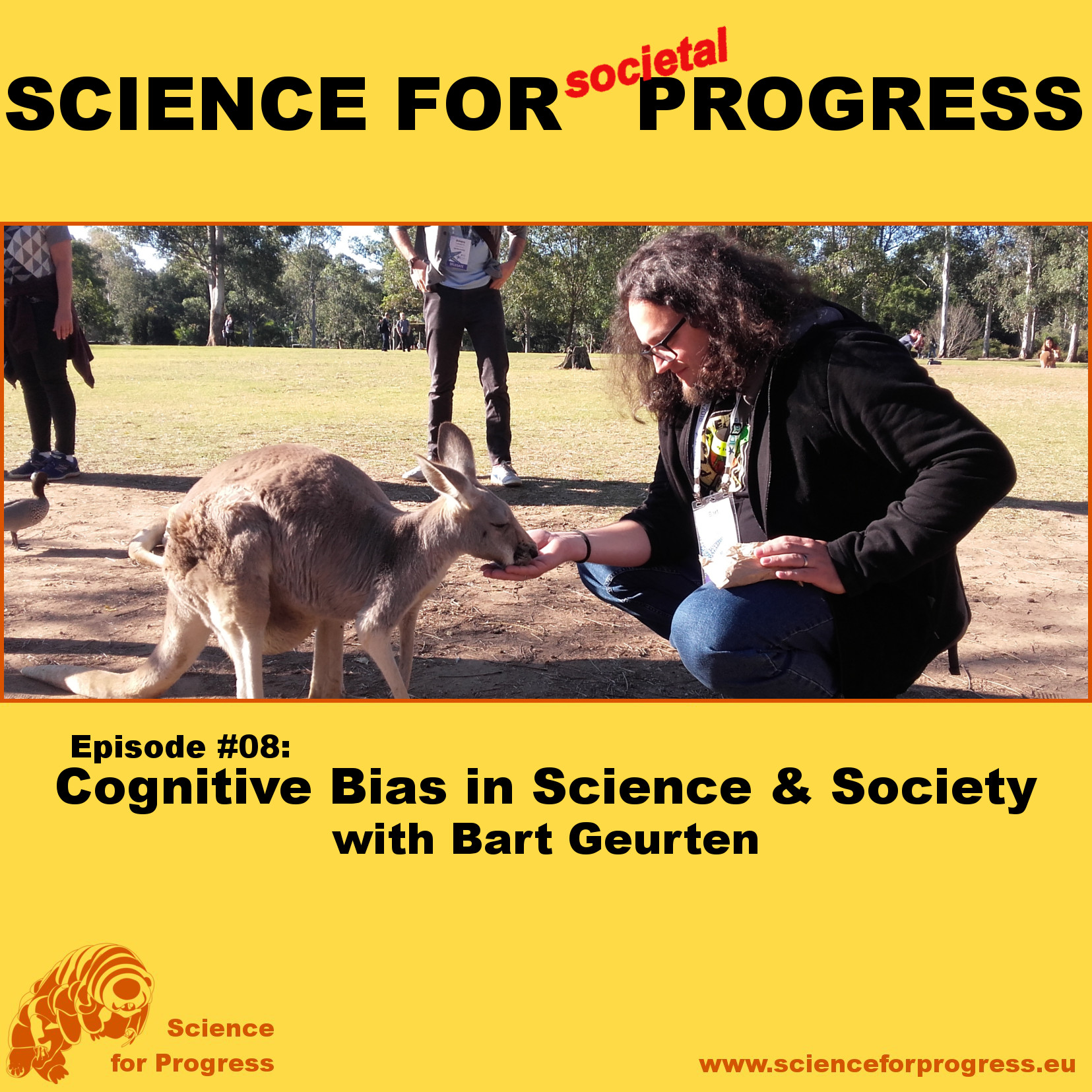
Science for Progress#8 Cognitive Biases in Science and Society – with Dr. Bart GeurtenScience compensates for the shortcomings of human cognition. It allows us to apply methods of investigation that are independent of our own subjective notions and irrationality. As a result we have overcome common sense, traditional beliefs, and other misconceptions through thorough investigation. We even describe and utilize phenomena that are as incomprehensible as quantum mechanics, which defies our everyday experience in unimaginable ways.
There is, however, a real struggle, here. Just like our brain perceives the non-existent 'Kanizsa's Triangle' (picture on the left), we make certain identifiable mistakes in cognitive thinking, too. This can really impact the way science is...
2018-09-0200 min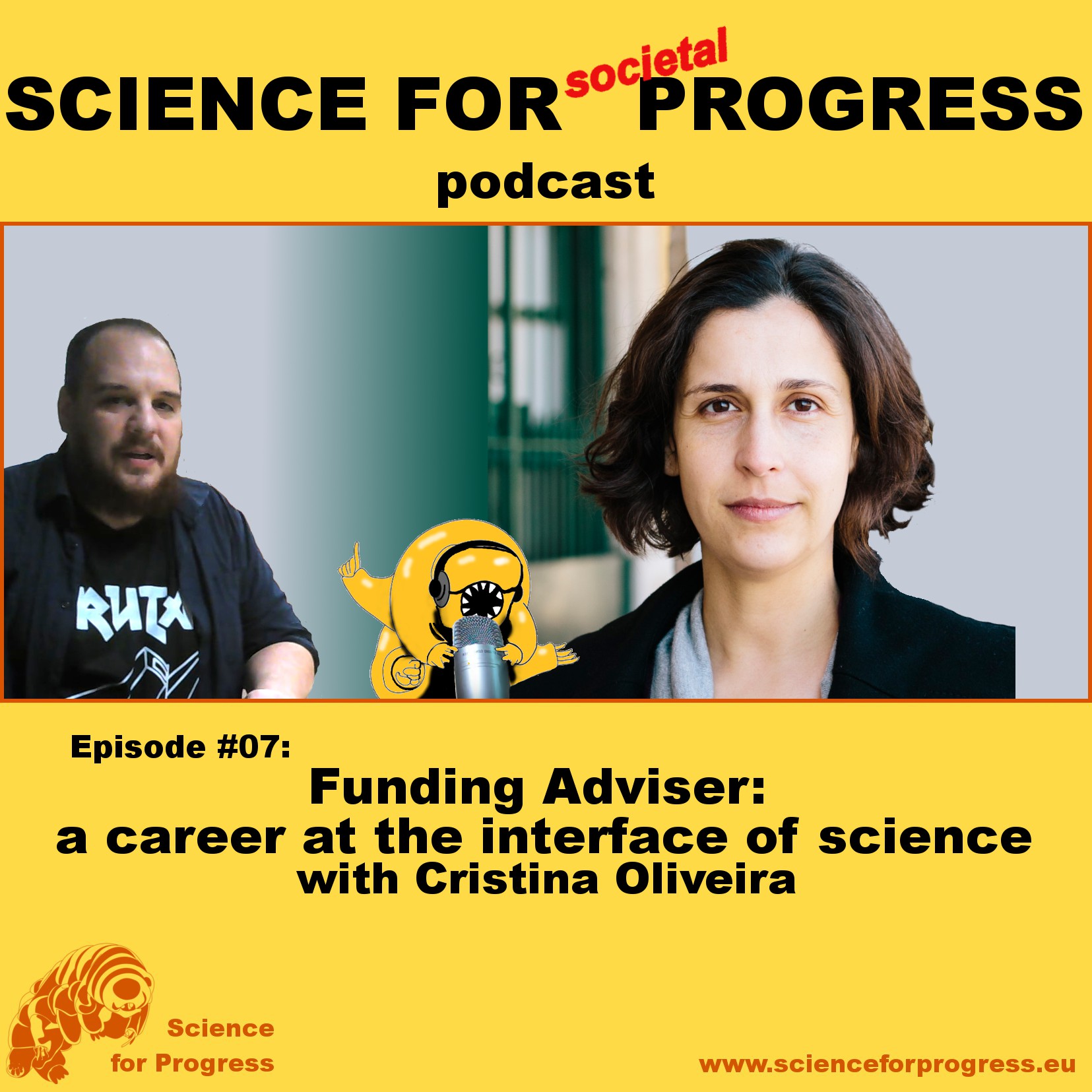
Science for Progress#7: Funding Adviser: career at the Interface of Science – with Cristina OliveiraMost academics won't stay in academia... or let's say, not every PhD will land a permanent position as a researcher. With the increasing numbers of PhDs this situation is becoming more serious. In this context, we want to interview people who work in so called 'alternative careers'. Some of these careers are still related to academia. We hope these interviews will be of interest to people in general, since they may learn something more about how academia works. For PhDs who may not stay researchers, it should be interesting to know what kinds of careers they can have beyond the...
2018-06-2400 min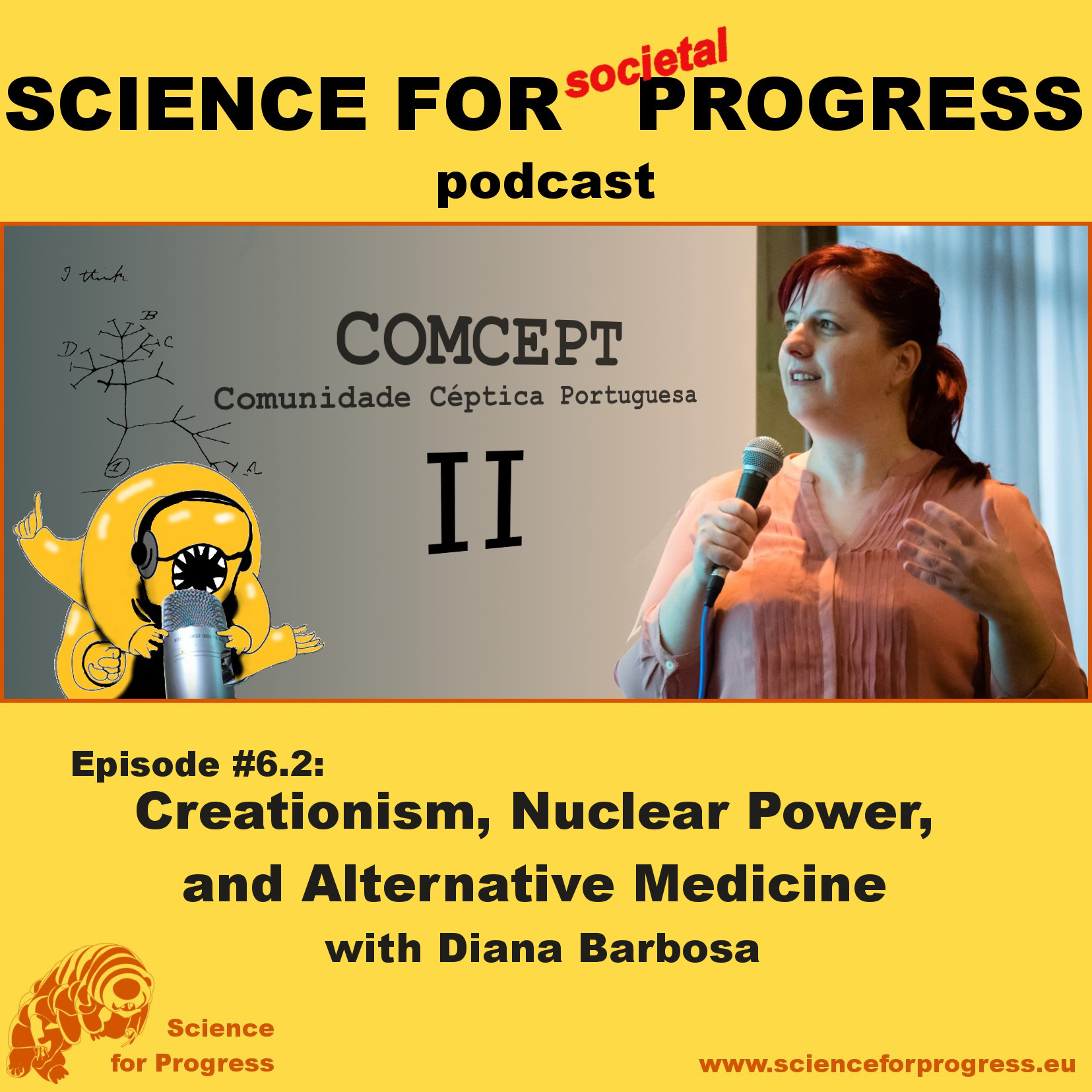
Science for Progress#6.2. Creationism, Nuclear Power, and Alternative Medicine – with Diana BarbosaThis is the 2nd part of my conversation with Diana Barbosa from COMCEPT, the Portuguese Skeptics Community (find the 1st episode here). In the first part of the episode we got an overview over scientific skepticism and what kinds of topics they would usually discuss. In a nutshell, skeptics are fighting against non-scientific viewpoints making their ways into mainstream opinion.
Now we talk a bit more in detail about creationism, nuclear power in the context of climate action, and alternative medicine:
Religion in and of itself is not necessarily a scientific topic, because religion and science don’t deal with th...
2018-06-1300 min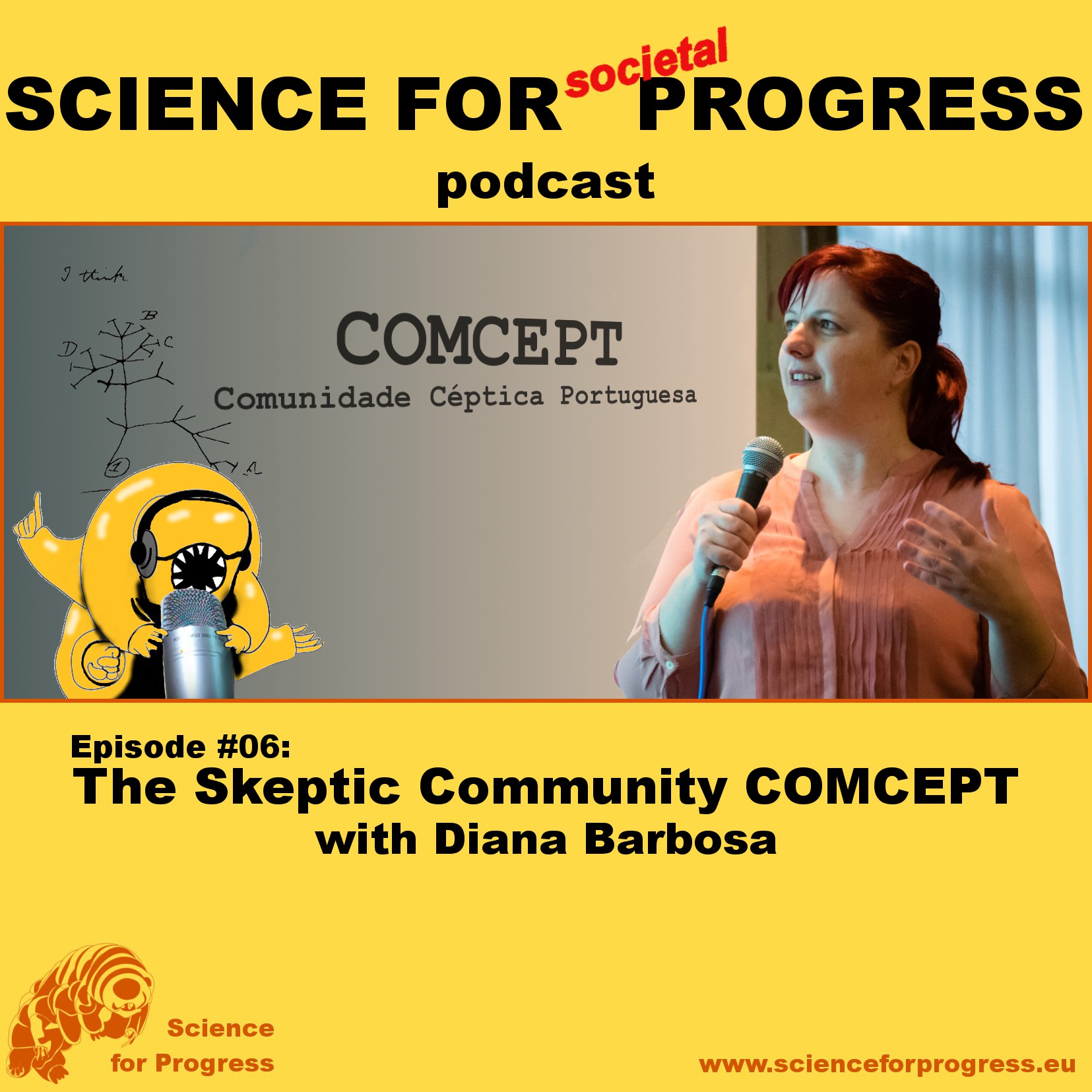
Science for Progress#6.1 Skepticism in Portugal: COMCEPT – with Diana BarbosaI had an extended conversation with Diana Barbosa (@diraquel on Twitter) from the skeptical society in Portugal, COMCEPT. This is the first of two parts to this episode where Diana Barbosa answers questions about what skepticism is, what skepticism is NOT, and how it is different from other, related movements. We get an overview of the goals and activities of COMCEPT meetings, and how to become a member!
Being skeptical means to be doubtful. Scientific Skepticism, however, isn't simply doubtful of everything. The skeptic can be convinced by scientific evidence. Having started mainly as a movement to overcome superstition, such...
2018-06-0300 min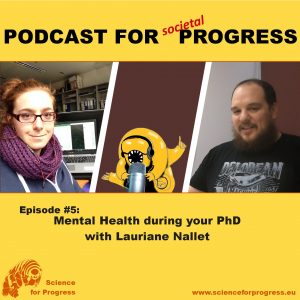
Science for Progress#5: Mental Health during your PhD – with Lauriane NalletWorking on your PhD is a stressful phase, and the academic culture isn't making it better. In this episode I talk to Lauriane Nallet, who is a PhD student in Switzerland. She has a personal history with depression and even PTSD. Lauriane shares what she learned at a workshop on mental health issues in grad school, and also her own experience with mental health issues: symptoms to look out for, how she found help, and what therapy could do for her. We also talk about some aspects of academia that contribute to the stress, including high expectations for work load...
2018-05-1300 min
Science for ProgressA brief introduction to the Portuguese skeptics community COMCEPTI interviewed Diana Barbosa about COMCEPT, a Portuguese skeptics community.
Diana told me about events they will be at over the next two weeks. However, the full episode is scheduled for June 1st.
So I cut together a brief intro into COMCEPT and promo for two events!
For Saturday afternoon, May 5th, COMCEPT is invited to talk about their book 'Não Se Deixe Enganar' (Don't fool yourself), a guide to skepticism, as well as other books and science communication at the livraria barata.
On May 12th, COMCEPT will have their monthly meeting. These meetings alternate between Lisbon and Porto. D...
2018-04-3000 min
Science for Societal Progress#4: Founding Science for Progress, and the representation of science in public – with Dennis EckmeierGuest Host: Hugo Bettencourt “We face a dilemma in conveying the scientific process to the public, and even within academia: Real science doesn’t fit the elements of effective storytelling.” Dennis had been vocal on topics surrounding academia, science and pseudoscience on social media for several years. Thus, he readily volunteered to co-organize the March for Science in Lisbon, in 2017. He wants to disseminate the understanding of science, humanities and academia by the public, but also systemic changes within academia. In the first part of this episode he explains how he...
2018-04-2233 min
Science for Progress#4: Founding Science for Progress, and the representation of science in public – with Dennis EckmeierGuest Host: Hugo Bettencourt
"We face a dilemma in conveying the scientific process to the public, and even within academia: Real science doesn't fit the elements of effective storytelling."
Dennis had been vocal on topics surrounding academia, science and pseudoscience on social media for several years. Thus, he readily volunteered to co-organize the March for Science in Lisbon, in 2017. He wants to disseminate the understanding of science, humanities and academia by the public, but also systemic changes within academia.
In the first part of this episode he explains how he decided to...
2018-04-2233 min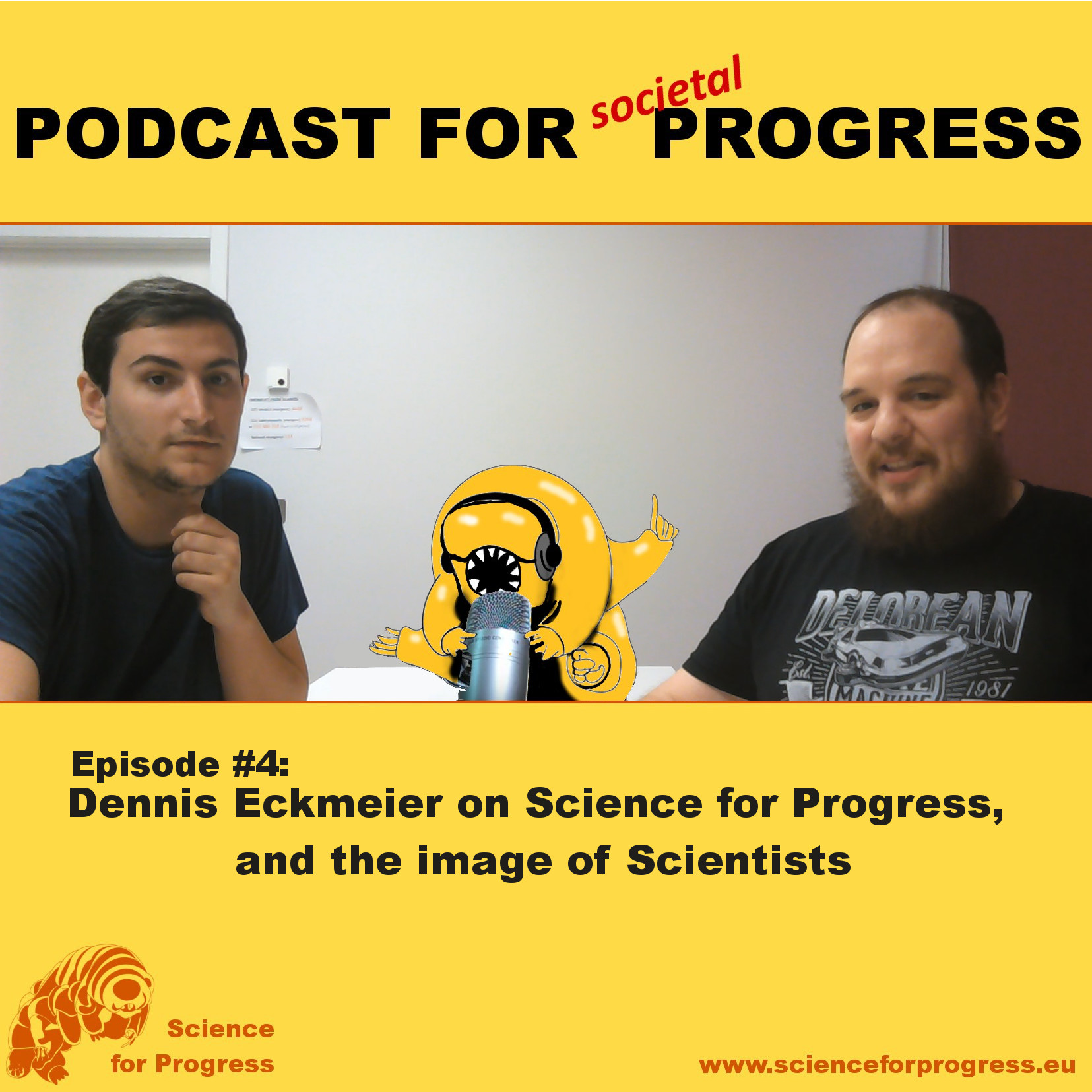
Science for Progress#4: Founding Science for Progress, and the representation of science in public – with Dennis EckmeierGuest Host: Hugo Bettencourt
"We face a dilemma in conveying the scientific process to the public, and even within academia: Real science doesn't fit the elements of effective storytelling."
Dennis had been vocal on topics surrounding academia, science and pseudoscience on social media for several years. Thus, he readily volunteered to co-organize the March for Science in Lisbon, in 2017. He wants to disseminate the understanding of science, humanities and academia by the public, but also systemic changes within academia.
In the first part of this episode he explains how he decided to found Science for Progress, and what our current...
2018-04-2200 min
Science for Progress#3: The March for Science in Germany – with Dr. Tanja Baudson and Claus Martin"The population says, 'this external funding lowers the trust in science!' " - Tanja Gabriele Baudson
"I think our task as citizens and as people interested in science, and in truth, and in freedom, [is] to prevent that something like what happened in the United States is going to happen in Germany aswell." - Claus Martin
Mark the date! The March for Science 2018 is on April 14th! Last year, the March for Science in Germany was the largest (in terms of number of marches) outside the USA. Dr. Tanja Gabriele Baudson, giftedness researcher and visiting professor at the University of...
2018-04-0100 min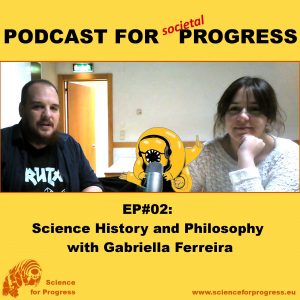
Science for Progress#2: Science History & Philosophy, and Research in Museum Collections – with Gabriella Ferreira"people should learn scientific knowledge to be able to discuss important topics and use science for good"
Our guest is Gabriella Ferreira, a masters student in Science Philosophy. She talks about her studies of Science Philosophy, and volunteer work at the Museu Nacional de História Natural e da Ciência. She worked on a collection of animals. The same in which Luís Ceríaco found a previously undescribed species. Gabriella showcases the importance of historical collections for current research efforts. Work done in natural history museums can be applied to conservation purposes, and to study the evolution of spec...
2018-03-1100 min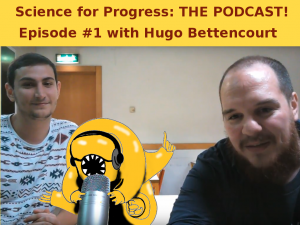
Science for Progress#1 Science Communication and FameLab – with Hugo BettencourtIn 2017, Hugo Bettencourt was finalist of the Portuguese section of the science communication competition ‘FameLab’, and appeared at the Noite Europeia dos Investigadores 2017. Here, he talks about this experience.
FameLab is an international science communication competition initiated by the British Council. Hugo explains the application process, and what is expected from the presentations. He also shares some of what he learned in the special science communication workshop for finalists. At the end he had a great experience and made some friends. And it even got him some additional gigs as a science communicator.
background
Born and raised in Lisbon, Hugo Bett...
2018-02-2000 min
BartocastDAGDZ (3) – Dennis EckmeierMit Dr. Dennis Eckmeier im Gespräch über Künstliche Intelligenz. Was ist das? Welche Arten gibt es? Was hat das mit menschlicherIntelligenz zu tun? Und was ist, wenn das Internet ein Bewußtsein hat, wir es aber nicht erkennen können, weil es … Weiterlesen →
The post DAGDZ (3) – Dennis Eckmeier first appeared on Bartocast.
2017-03-1557 min